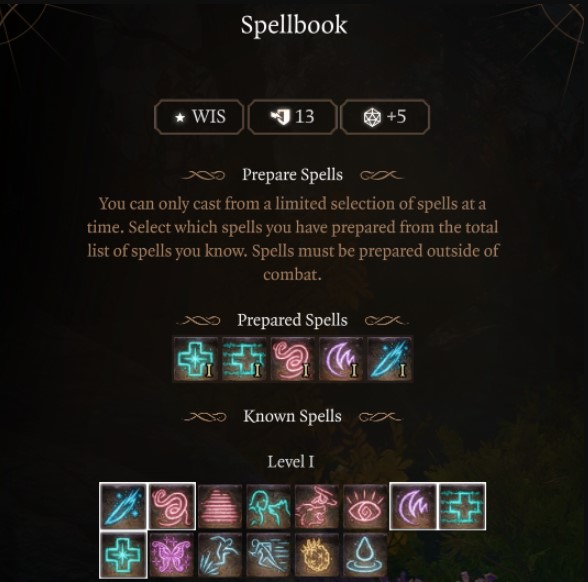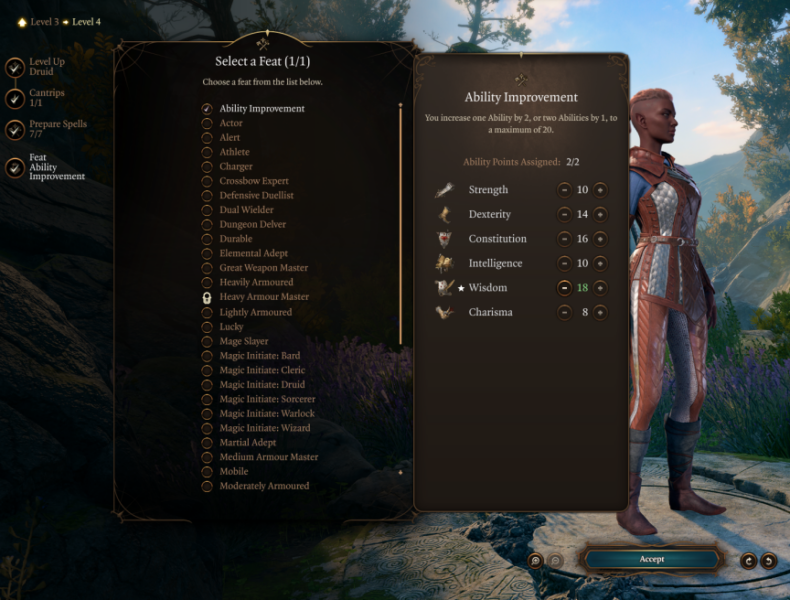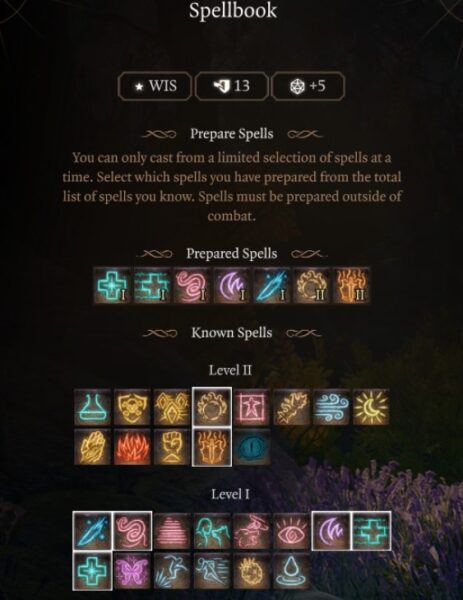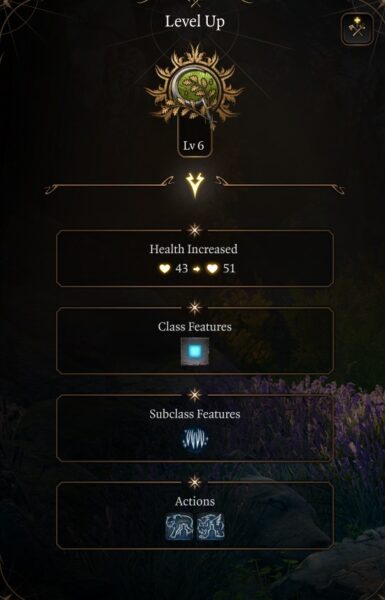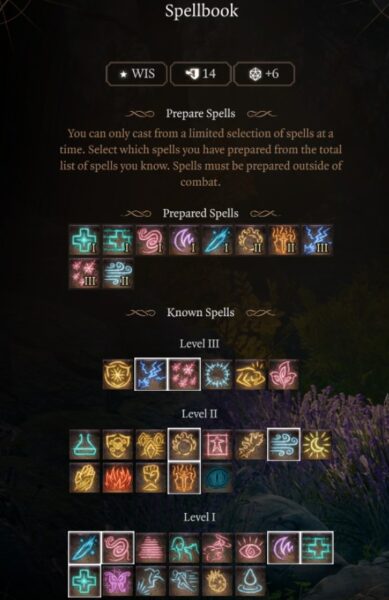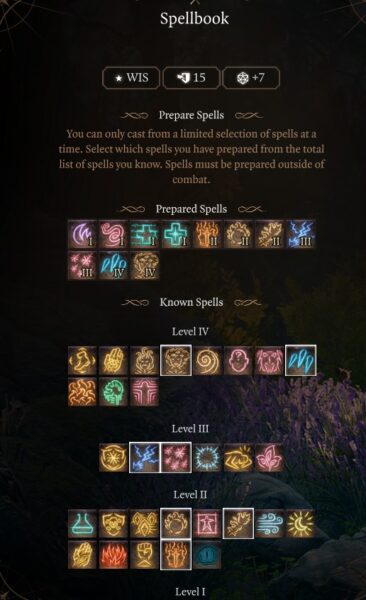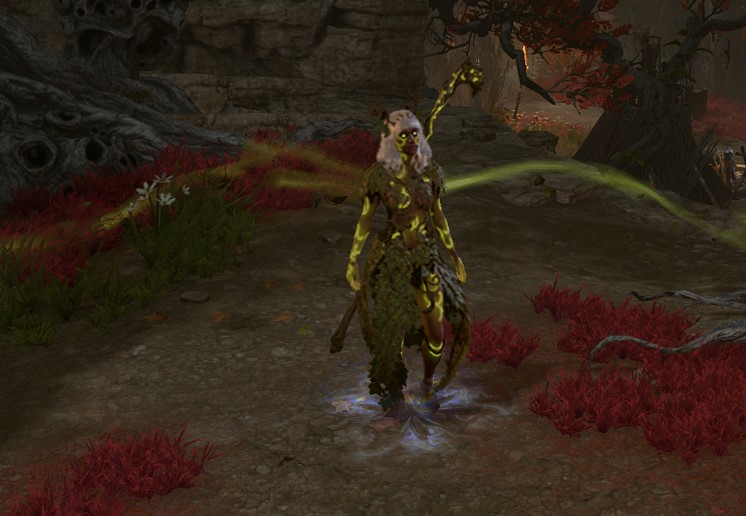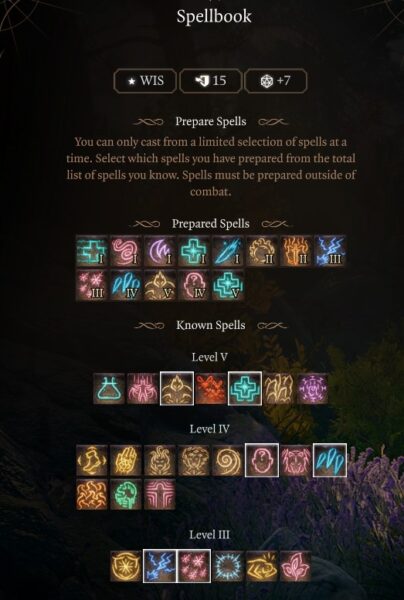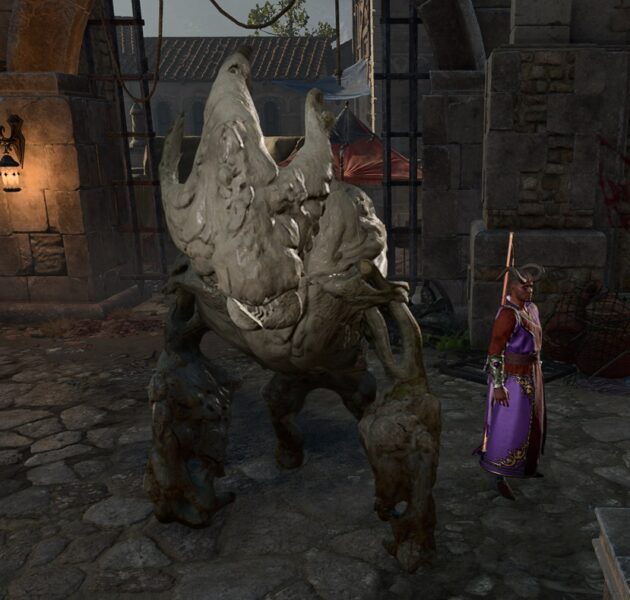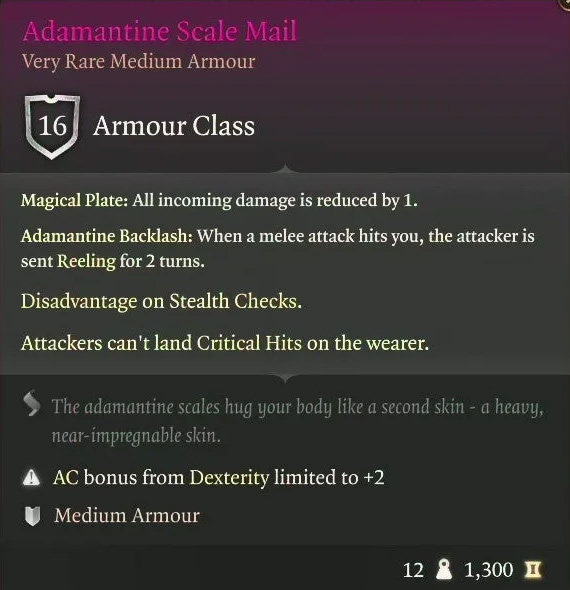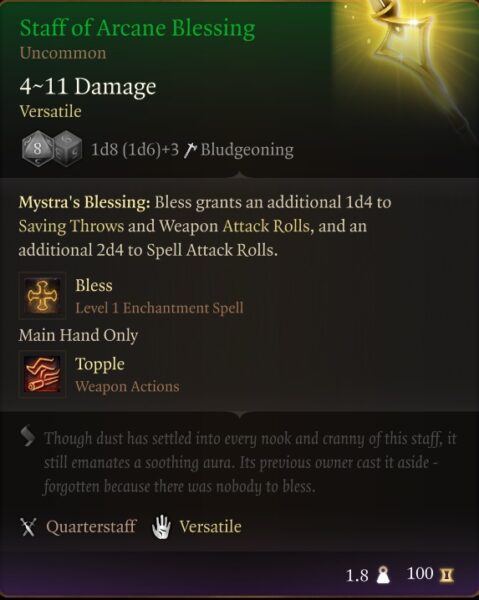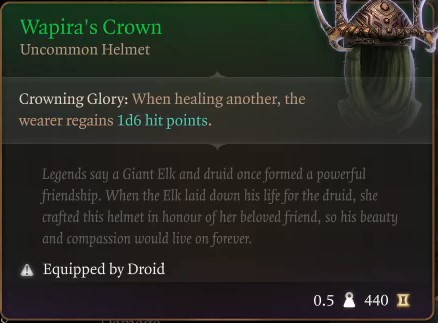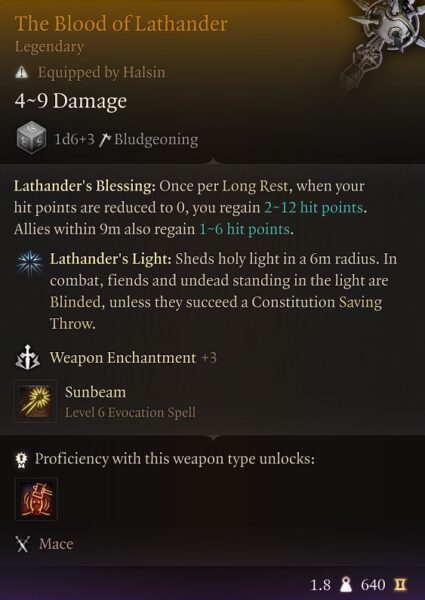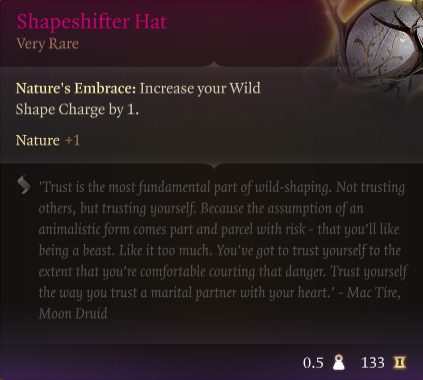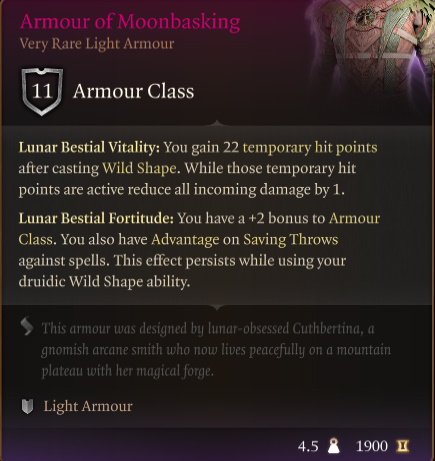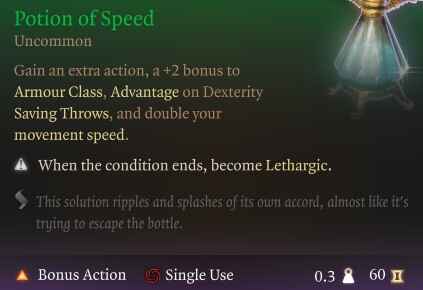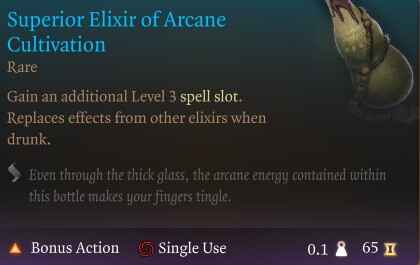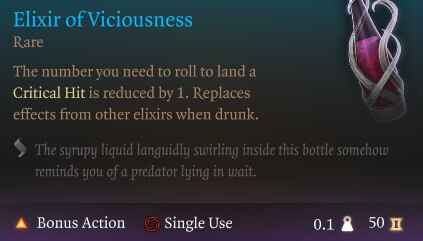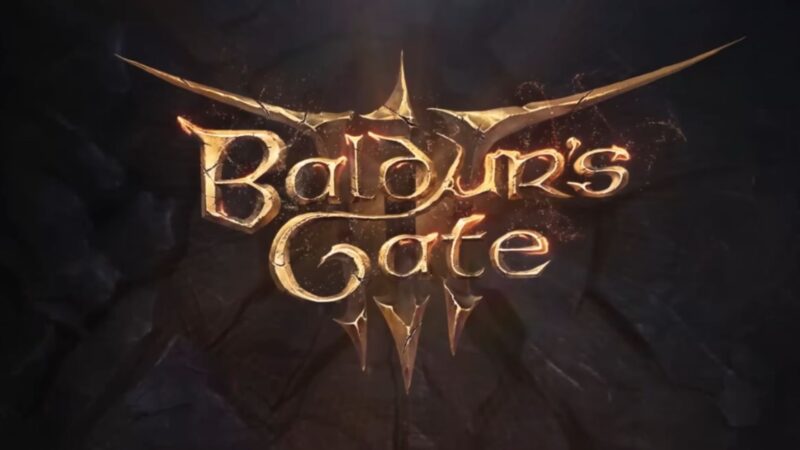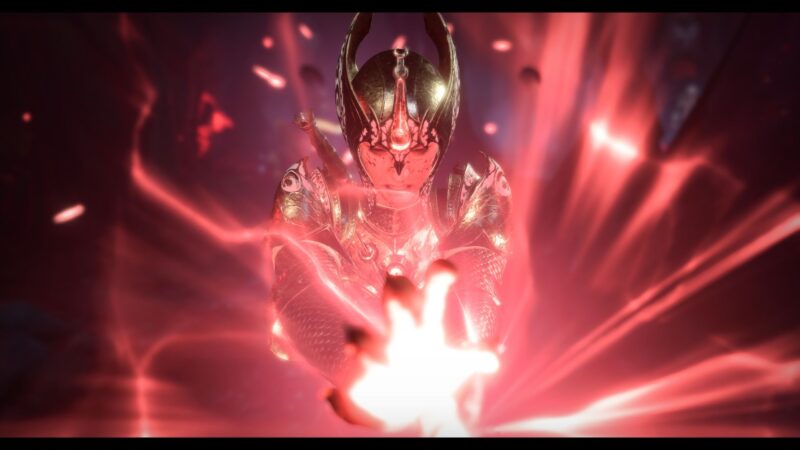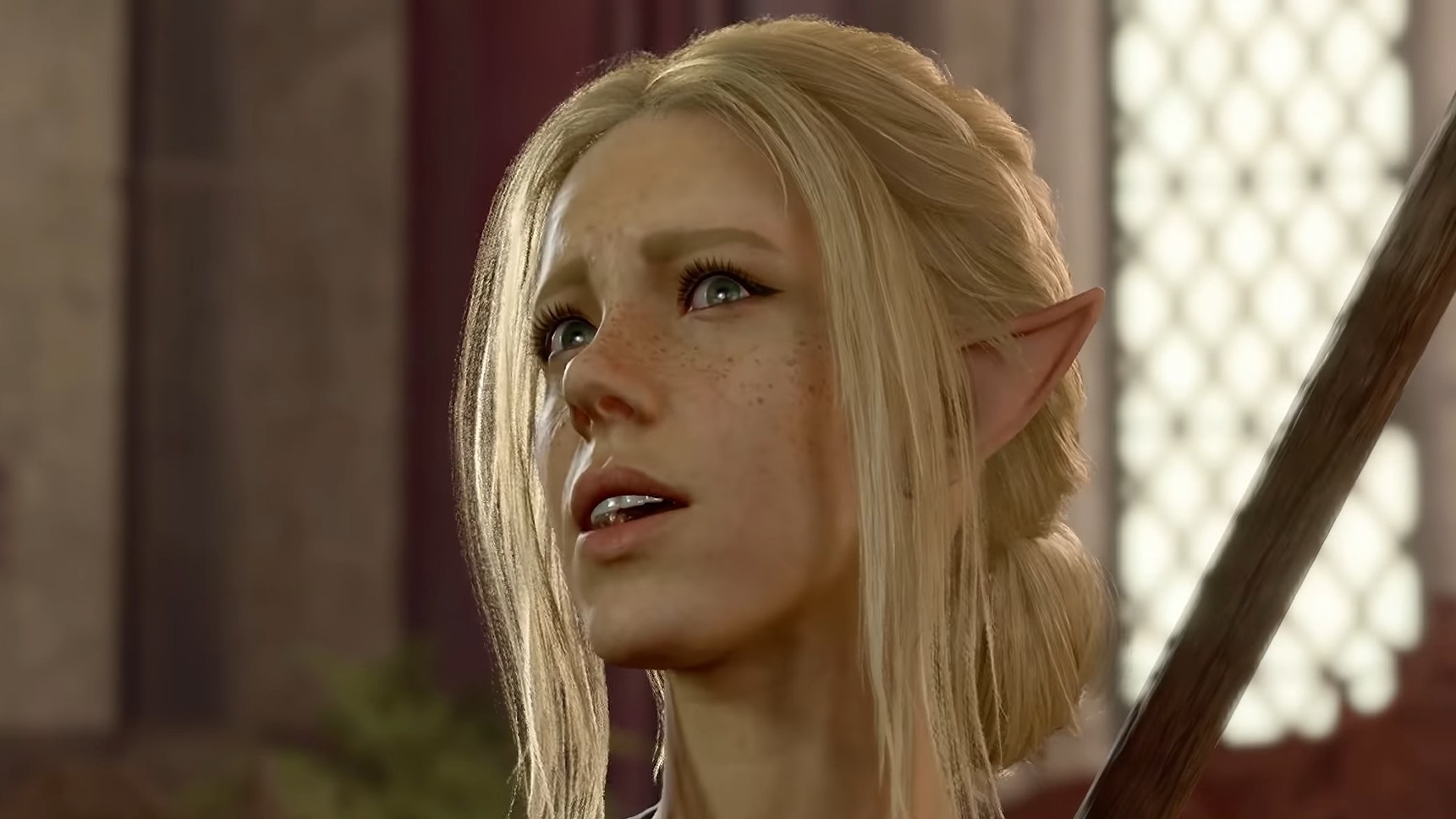This guide focuses on the best Druid build in Baldur’s Gate 3, the Circle of the Moon Subclass, and includes all components to build a powerful character.
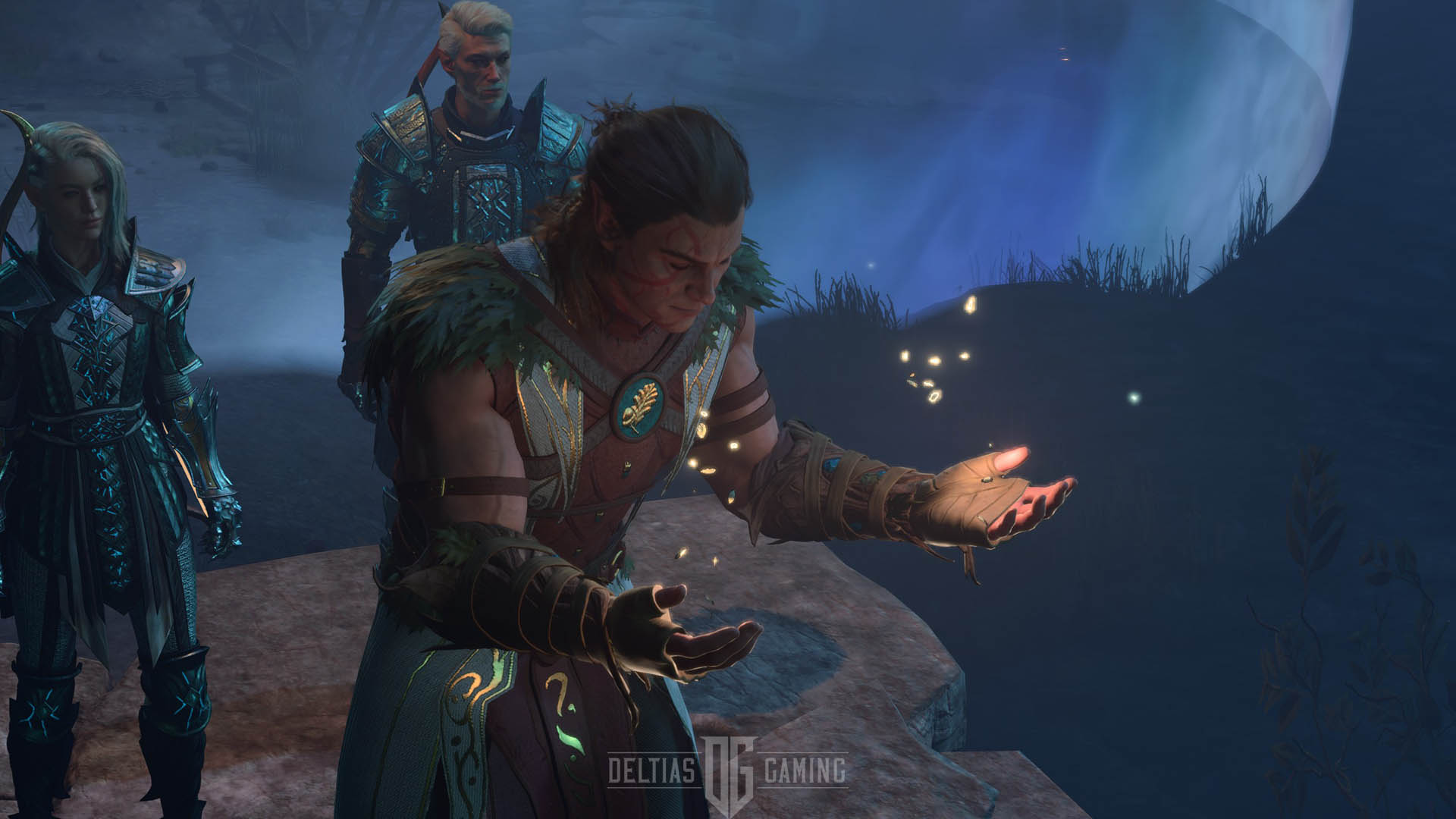
This build page has been updated for the Patch 8 version of Baldur’s Gate 3.
Everything About the Circle of the Moon Druid
The Druid Class and the Circle of the Moon subclass has an incredibly unique action called Wild Shape which allows them to transform into various powerful beast creatures. As you level the class, you will unlock new and more powerful forms. Furthermore, these beast forms primarily give your build strength as a damage dealing machine. Additionally, many of the forms also have specific actions that can provide crowd control against enemies. Wild Shape forms can also provide Druids with additional survivability, as each beast form comes with it’s own separate health bar.
Therefore, a Circle of the Moon Druid is fun and powerful blend of spellcasting and melee. Typical playstyle during combat is to start by casting a spell, and then using Wild Shape to transform as a bonus action at the end of your turn. If you are fancinated by the idea of being able to shape-shift and love the blended gameplay style that lets you support and deal damage, then the Circle of the Moon Druid in Baldur’s Gate 3 is for you.
Patch 8 Changes to Circle of the Moon Druid for BG3
Patch 8 brings a major update to the Druid class in Baldur’s Gate 3 with the introduction of the Circle of Stars subclass. Unlike traditional Druids focused on shapeshifting or nature control, this archetype emphasizes ranged spellcasting, combining celestial magic with steady offensive output. Key features like free Guiding Bolt and a passive 1d6 attack bonus make it feel like a magical marksman, especially strong in the early game. When paired with Act 1 gear, it performs impressively with low complexity. However, its effectiveness fades later in the campaign, and by Act 3, it’s often outpaced by more scalable builds.
Consequently, the Circle of the Moon subclass still remains the strongest for Druids in BG3. It remains incredibly powerful even without subclassing, and with the right build you could even conceivably solo the game. This build will make for a strong support and damage character in your regular party, especially once you reach Level 6 and gain the Owlbear transformation.
Circle of the Moon Druid Class Guide
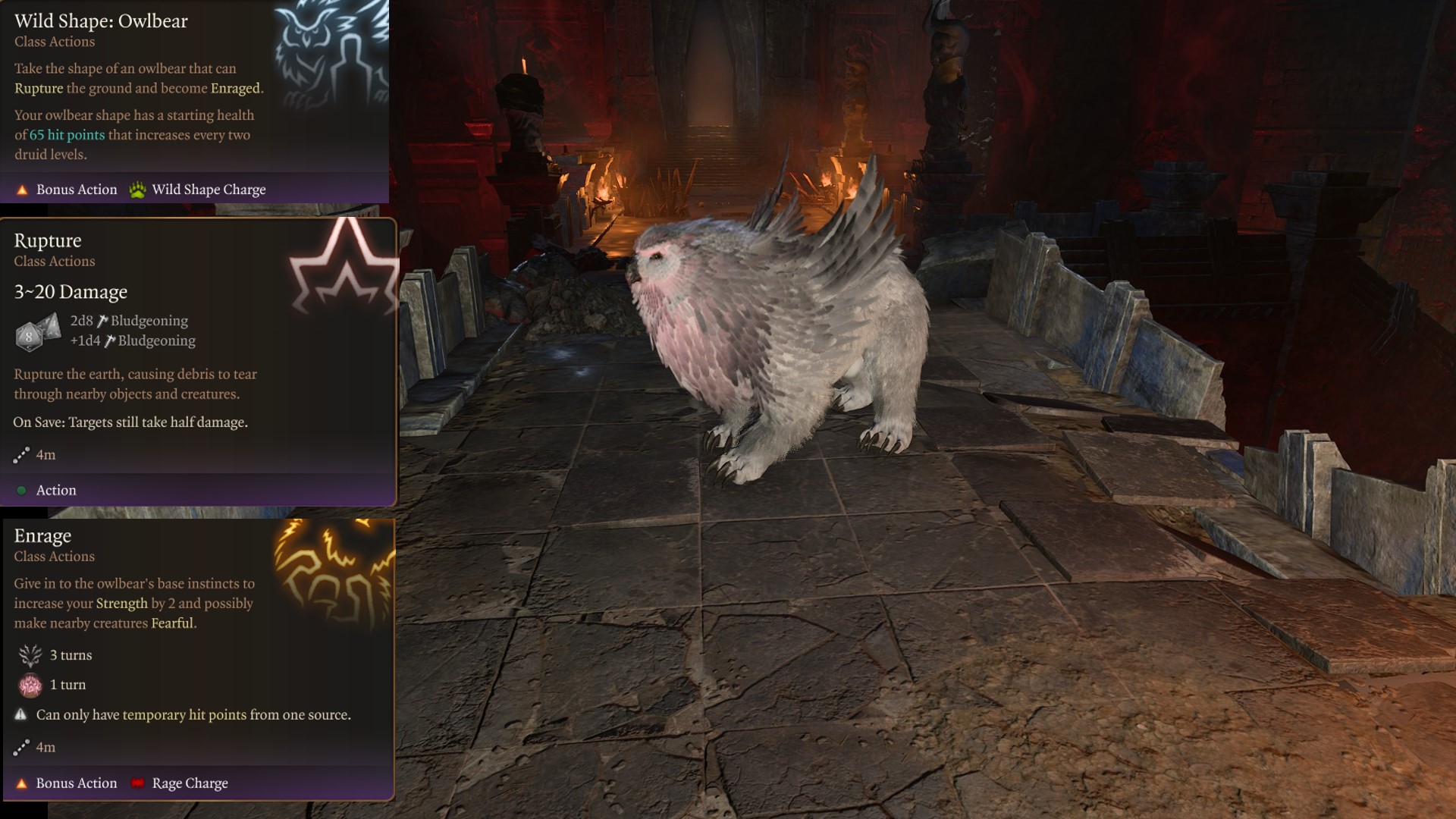
In Baldur’s Gate 3, Druids are spellcasters who wield and manipulate nature magic and can transform into various animals thanks to the Wild Shape ability. They shape-shift into a wolf, bear, spider, and much more, each granting them unique tactical advantages. Druids excel at support roles, crowd control, and summoning, making them valuable assets to any party. Consider Druid’s survivability high due to Wild Shape and healing.
With their high damage output, shapeshifting abilities, and healing spells, Druids are a great addition to any party. The class also feels and plays very unique, fun, and different from others in Baldur’s Gate 3.
Druid Class Mechanics
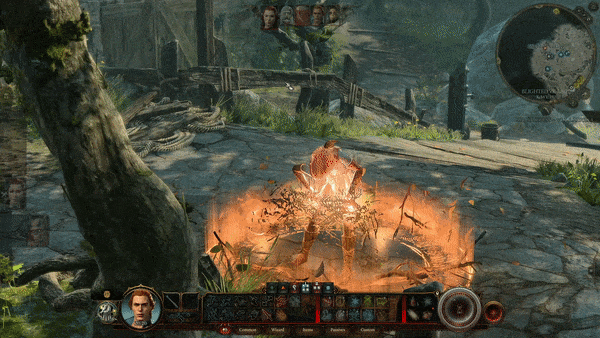
Here is a list of all the essential Spell Mechanics in Baldur’s Gate 3 for Druid Build:
- Primary Ability: Wisdom
- Secondary Ability: Constitution
- Saving Throw Proficiencies: Wisdom and Intelligence
- Armour Proficiency: Light Armour, Medium Armour, Shields
- Weapon Proficiency: Clubs, Daggers, Javelins, Maces, Quarterstaves, Scimitars, Sickles, Spears
- Preferred Armor: Light
- Preferred Weapon: Quarterstaff or Spear
- Combat Wild Shape: As a Bonus Action, you can assume the form of a beast.
- Lunar Mend: Expend spell slots to regain hit points while wild-shaped.
- Primal Strike: While in beast form, your attacks count as magical to overcome Resistance.
- Wild Shape: Creature transformation
Druid Wild Shape Transformation
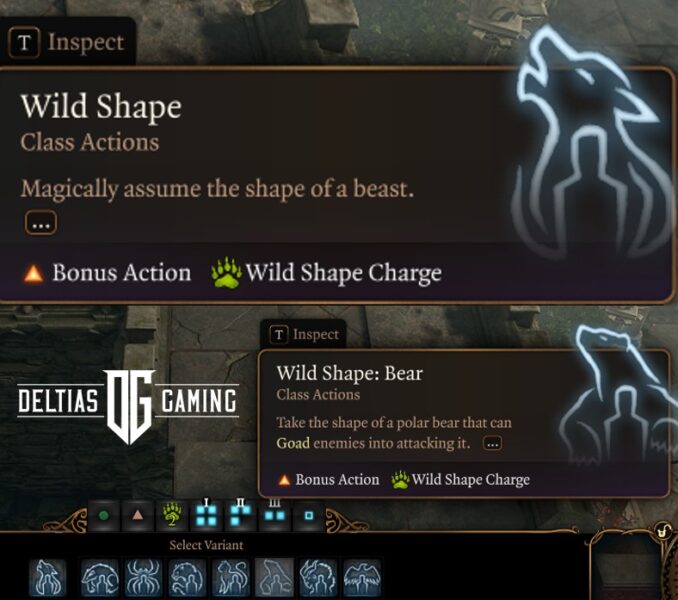
In Baldur’s Gate 3, Druids can use the Wild Shape ability to transform into a beast form. This ability is available once the Druid reaches level 2, and they have two charges of Wild Shape that they can replenish with each short rest.
When a druid Wild Shapes, they take on the game statistics of their beast form, including their hit points, armor class, movement speed, Strength, Dexterity, and Constitution scores. They also gain the special abilities of their beast form, such as the ability to climb walls, fly or breathe underwater.
However, there are some limitations to Wild Shape. The druid’s Intelligence, Wisdom, and Charisma scores remain the same, so they cannot cast spells or speak in animal form. Additionally, the druid’s equipment merges into their animal form and cannot be used until they revert to their humanoid form. The type of beast form that a druid can Wild Shape into depends on their subclass.
Related:
Druid Wild Shape Explained
The Druid possesses a powerful ability Wild Shape that can give druids a significant advantage in combat. It allows them to transform into a variety of different beasts, each with its own unique strengths and abilities. This can make them difficult to defeat, and it can also give them the ability to perform actions that would be impossible in their humanoid form. Notes about Wild Shape:
- Cost Bonus Action
- Wild Shape Doesn’t Drop concentration
- While in Wild Shape, if you use all HP, return to human form
- While in Wild Shape, gain access to a self-heal
While Wild Shape is great, but also limits your ability to heal allies which can be critical. The idea on how to use it is, to use a powerful spell, even one that costs concentration as your action on your first turn. Then use your bonus action to Wild Shape. Also of note, the creatures you Wild Shape into, will have their own set of skills, ability scores, and so forth. You can even drink potions in their form. The creature attacks scale in damage from Strength on most, but pumping up your individual strength won’t make them hit harder. So, stick to stacking Wisdom and Constitution and rely on the individual Shape’s ability score for offensive and defensive potential.
Druid Wild Shape Forms
| Shape | HP | Skills |
|---|---|---|
| Cat | 2 | Claws Meow |
| Badger | 13 | Bite Claws Burrow |
| Bear | 30 | Goading Roar Claws |
| Wolf | 18 | Inciting Howl Bite Exposing Bite |
| Spider | 20 | Web Venomous Bite |
| Dire Raven | 21 | Beak Attack Rend Vision |
| Deep Rothé | 23 | Gore Charge |
| Owlbear | 65 | Enrage, Rupture |
| Panther | 45 | Jagular Strike, Prowl, Pounce |
| Sabre Toothed Tiger | 62 | Shred Armour, Jagular Strike |
| Dilophosaurus | 74 | Bite, Corrosive Spit, Pounce |
Wild Shape Forms
- Cat: shape gets 2 hit points and a simple melee attack and Meow which acts as a distraction.
- Badger: shape gets 13 hit points, bite melee attack, a Claw action knockback and Burrow attack.
- Bear: shape gets a massive 30 hit points to start, a claw attack, and a Roar.
- Wolf: shape of a dire wolf that can increase its allies’ movement speed and leave its enemies by guaranteeing a critical strike.
- Spider: shape starts with 20 hit points and has Venomous Bite action that does damage and possibly poisons targets.
- Dire Raven: shape starts with 21 HP, a peck attack and Rend Vision which can Blind enemies.
- Deep Rothé: shape starts with 23 HP, has a force attack Gore and Charge.
- Panther: Can turn invisible and attack from shadows, gaining an advantage.
- Sabre Toothed Tiger: Prone Enemies will receive huge damage.
- Dilophosaurus: Take the shape of a dilophosaurus whose Corrosive Spit can dissolve a target’s Armour Class
Also Check:- BG3 Interactive Map
Druid Spell Mechanics
- Cantrips: are like spells, but you can cast them infinitely, and they don’t require spell slots.
- Spell Slots: these are the limited resource for casting spells that can be replenished on long rest.
- Spell Levels: this refers to the potency and level of the spell, in BG3 they will go up to level 6.
- Prepared Spells: allow you to swap in and out spells in between combat.
- Concentration: is a spell mechanic that requires you to maintain concentration otherwise, the spell effect ends.
- Replacement Spells: Upon leveling up, you can learn and unlearn spells if you made a mistake in spell selection.
Druid Best Subclass – Circle of the Moon
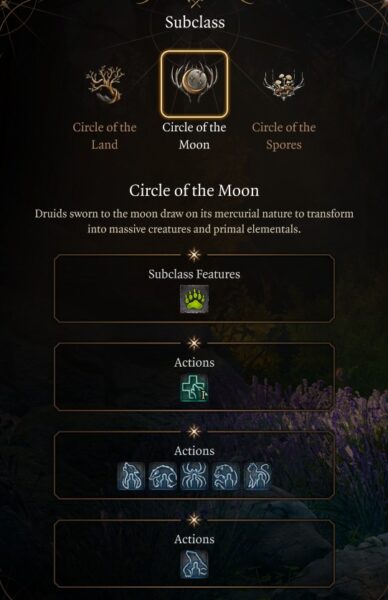
The Best Subclass for the Druid is Circle of the Moon, focusing on transforming into Beast using the Wild Shape action do high damage and sill cast spells. In Baldur’s Gate 3, the Druid class offers various subclasses, which will have more upon full release of the game. At level two, you can make your decision on which to pick. Here’s a brief description of the Druid’s subclasses and their strengths:
- Circle of the Moon: This subclass emphasizes the Druid’s ability to transform into powerful beasts. Druids of the Circle of the Moon gain enhanced Wild Shape abilities, allowing them to transform into more potent creatures at an earlier level. They can also use Wild Shape as a bonus action and have increased hit points while in Wild Shape form. This subclass is well-suited for those who enjoy melee combat and shape-shifting.
- Circle of the Land: This subclass focuses on the connection between the Druid and the natural world. Druids of the Circle of the Land gain additional spells based on the type of terrain they choose as their circle, such as Arctic, Coast, Desert, Forest, Grassland, Mountain, Swamp, or Underdark. These additional spells provide versatility and thematic flavor to the Druid’s spellcasting.
- Circle of Spores: It’s a druid subclass in Baldur’s Gate 3 that focuses on using the power of decay and fungi to fight their enemies.
Baldur’s Gate 3 Circle of the Moon Druid Features & Progression
We are focused on high damage, survivability, and group utility so Circle of the Moon makes the best choice for our Druid. This will allow us to optimize Wild Shape usage and focus on becoming wild creatures which get much more powerful later in the game.
The Circle of the Moon Druid subclass unlocks the following features and spells:
- Lunar Mend (Level 2): Expend spell slots to regain Hit Points while in Wild Shape.
- Combat Wild Shape (Level 2): Wild Shape now uses a Bonus Action instead of an Action.
- Available Wild Shapes (Level 2): Badger, Bear, Cat, Spider, Wolf
- Available Wild Shapes (Level 4): Dire Raven and Deep Rothé
- Wild Strike (Level 5): You can make an additional attack after making an unarmed strike while in Wild Shape.
- Primal Strike (Level 6): While in beast form, your attacks count as magical for the purpose of overcoming resistance and immunity to non-magical damage.
- Available Wild Shapes (Level 6): Panther and Owlbear
- Available Wild Shapes (Level 8): Sabre-Toothed Tiger
- Improved Wild Strike (Level 10): You can make 2 additional attacks after making an unarmed strike while in Wild Shape.
- Available Wild Shapes (Level 10): Dilophosaurus, Air Myrmidon, Earth Myrmidon, Fire Myrmidon, Water Myrmidon
Character Creation for Circle of the Moon Druid
| Category | Selection |
|---|---|
| Character | Origin – Custom Character |
| Race | Wood Half-Elf |
| Racial Bonus | Darkvision, Fey Ancestry, Fleet of Foot |
| Class | Druid |
| Subclass | Circle of the Moon |
| Cantrips | Shillelagh, Thorn Whip, Guidance |
| Spells | Healing Wound, Entangle, Thunderwave, Cure Wounds, Ice Knife, Heat Metal |
| Background | Folk Hero |
| Ability Score | STR: 8 DEX: 14 CON: 16 INT: 10 WIS: 16 CHA: 10 |
| Skill Proficiencies | Nature and Perception |
Recommended Backgrounds
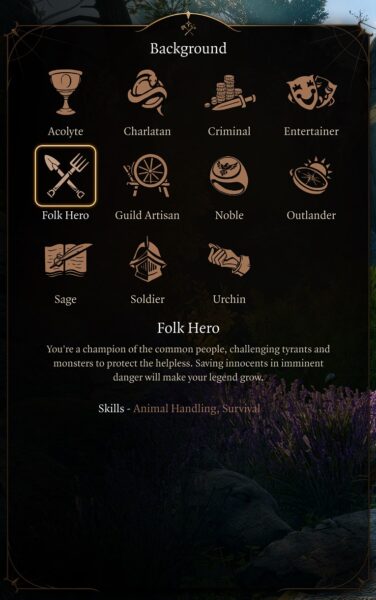
Folk Hero is the Best Background for the Best Baldur’s Gate 3 Druid Circle of the Moon Build because you gain proficiency in two Wisdom skills Animal Handling and Survival. This choice mostly influences roleplaying and dialogue options aspects and allows you to create unique characters. Additional choices are:
- Folk Hero: Proficiency in Animal Handling (wisdom) and Survival (wisdom). You’re a champion of the common people, challenging tyrants, and monsters to protect the helpless. Folk Hero companions in BG3 are Minsc and Wyll.
- Acolyte: Proficiency in Insight (wisdom) and Religion (intelligence). You have spent your life serving a temple, learning sacred rites, and providing sacrifices to the god or gods you worship. Shadowheart is an Acolyte.
- Outlander: Proficiency in Athletics (strength) and Survival (wisdom). You grew up in the wilds, learning to survive far from the comforts of civilization. Outlander companions in BG3 are Halsin and Karlach.
Best Race Choice Circle of the Moon Druid Build
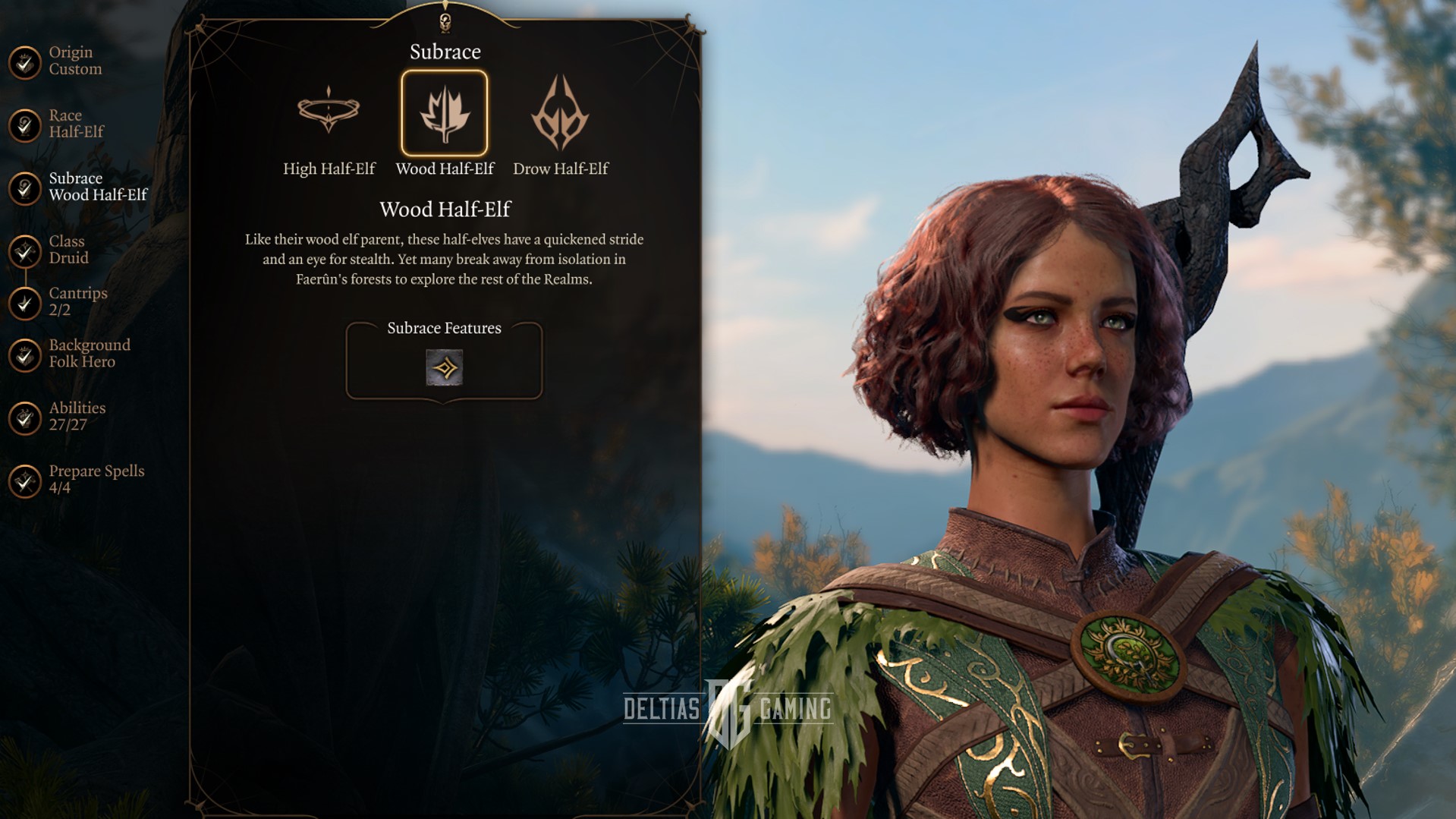
The Wood Half-Elf is the best race choice for the Best Baldur’s Gate 3 Druid Circle of the Moon Build because of the increased movement speed, Darkvision, and Fey Ancestry. The Duergar Dwarf is the second choice because of Enlarage and Invisibility spells though they lack high movement speed.
| Wood Half-Elf | Duergar Dwarf |
|---|---|
| Fleet of Foot (10.5m movement) | Enlarge Spell |
| Fey Ancestry | Invisibility Spell |
| Darkvision | Superior Darkvision |
| Stealth Profeciency | Duergar Resilience |
The Druid’s racial choice will not influence ability score, but everyone should get a +2 and +1 to spend regardless. This frees your race choice up to not completely hinder yourself based on ability score, but race features. Each of these races offers unique advantages that can enhance your combat prowess, survivability, or utility. Additionally, consider the roleplaying opportunities and character concepts that resonate with you.
Recommended Skills for Druid Circle of the Moon Build
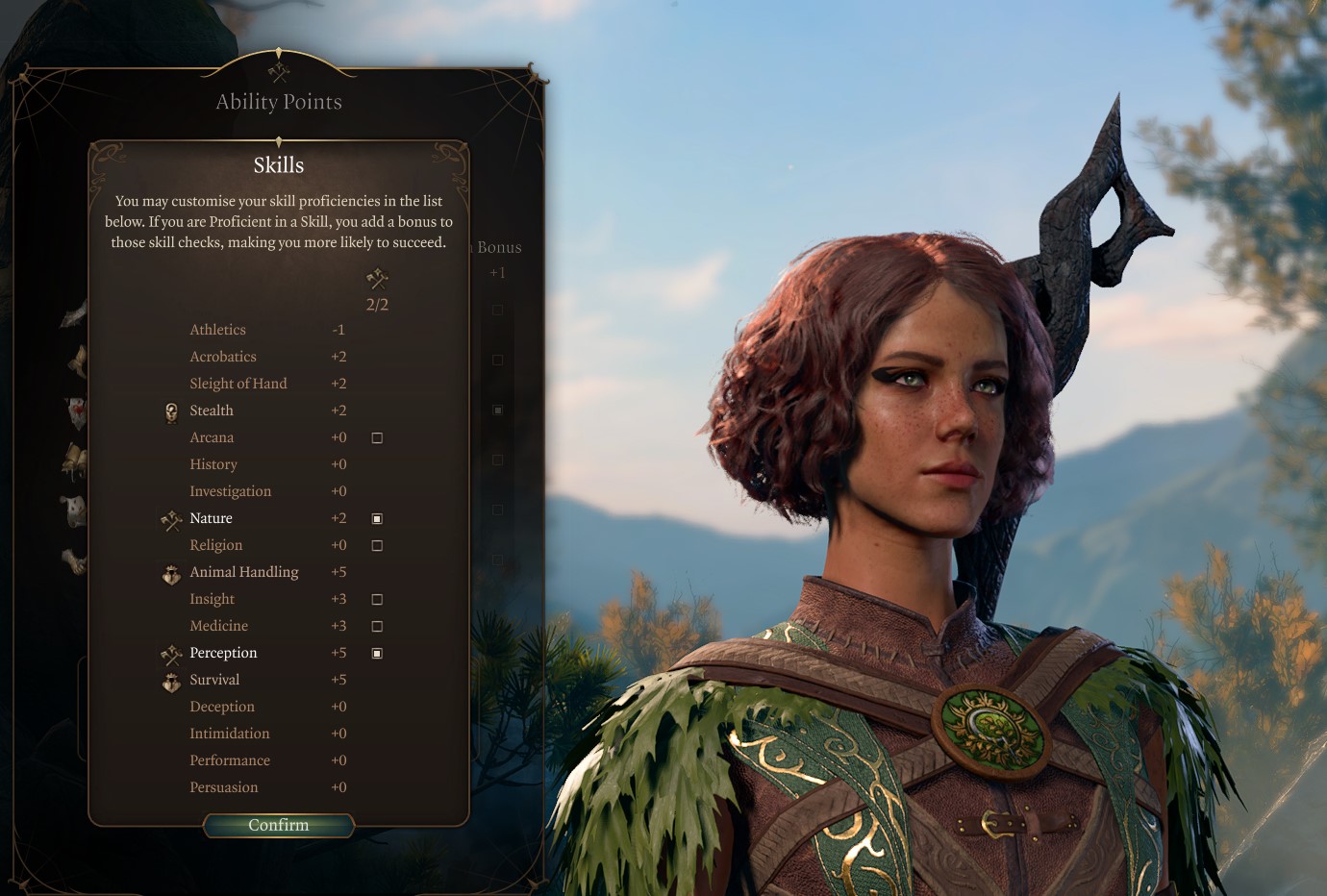
Nature and Perception are the best skills for the Best Baldur’s Gate 3 Druid Circle of the Moon Build because they complement your class abilities and enhance your effectiveness in various situations. In Baldur’s Gate 3, skills represent the abilities and proficiencies of your character that allow them to perform various actions and interact with the game world. Skills are associated with specific attributes and are used to determine the success or effectiveness of certain actions or abilities. They can be edited during character creation or with companions, during respec or reroll screen.
Here are the skills for Druid in Baldur’s Gate 3:
- Nature: is an Intelligence skill used in dialogue when dealing with natural environments.
- Perception: Wisdom skill that spots hidden containers, mechanisms, traps, and creatures.
Best Circle of the Moon Druid Ability Scores
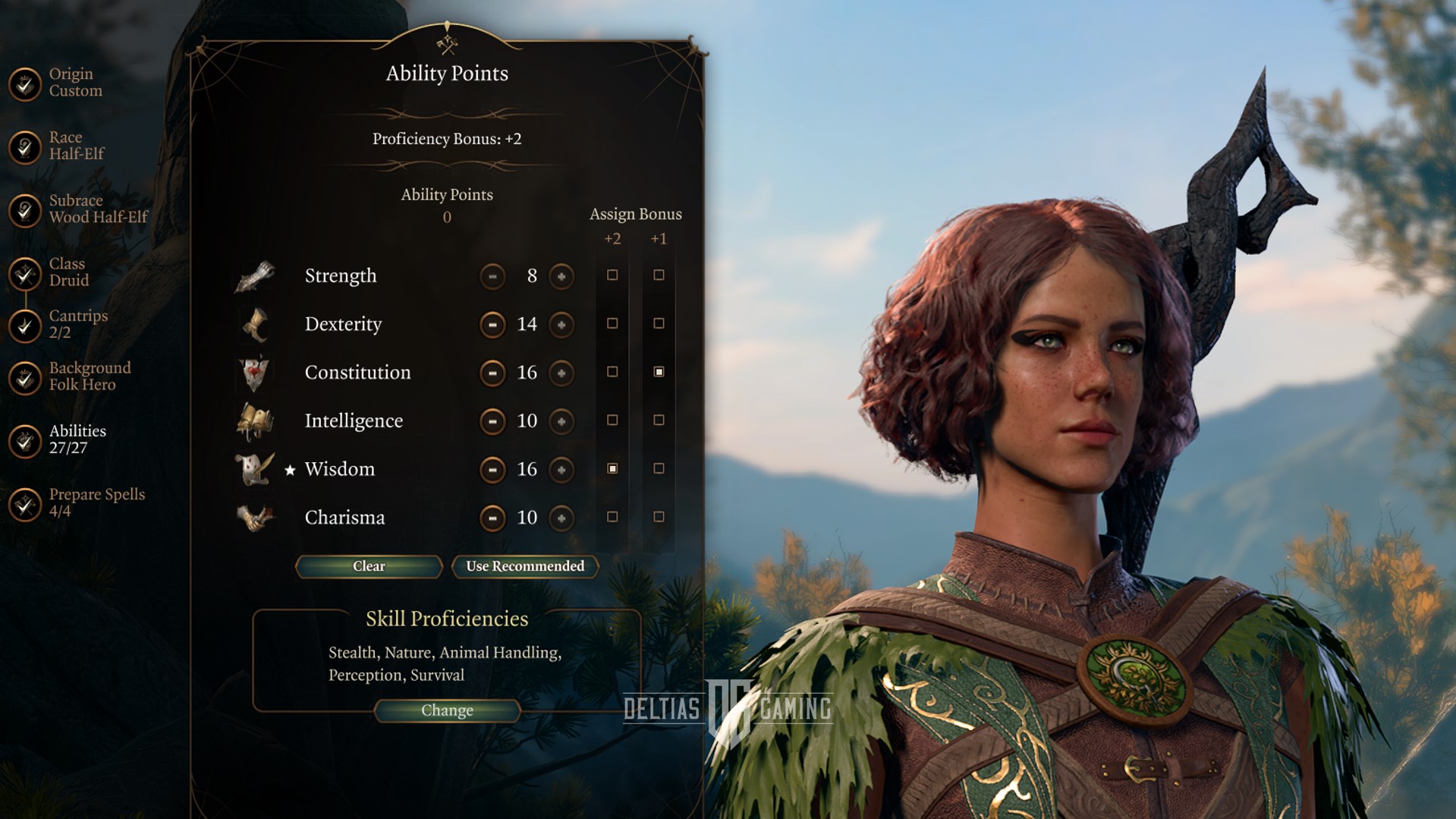
Below is the best ability score to unlock the full potential of a Best Baldur’s Gate 3 Druid Circle of the Moon Build:
| Ability | Points Goal |
|---|---|
| Strength | 8 |
| Dexterity | 14 |
| Constitution | 16 |
| Intelligence | 10 |
| Wisdom | 16 |
| Charisma | 10 |
The best ability score for the Druid reaches 16 Wisdom to increase spellcasting potency, then 16 Constitution which helps with concentration spells and health. 14 Dexterity is the next priority because this can add to your Armour Class (AC) while wearing medium armor. This will give you a great blend of survivability and damage, while the Wild Shape creatures will have their ability score when you transform.
You can increase your ability score via a quest in Act 1, Act 2, and Act 3. Make sure to check out our Permanent bonus guide on how you can boost your ability score through quests.
Best Companions for Circle of the Moon Druid Build
For the Best Baldur’s Gate 3 Druid Circle of the Moon Build, we do not recommend an third upfront damage dealer as both you and either Lae’zel or Karlach will fulfill that role. The premise of the build is to have one to two melee fights with a heavy damage dealer, your Druid providing support. Having range casters and damage dealers will help with crowd control, area damage, and burst at range.
- Lae’zel (Fighter): damage, high survivability, and in-your-face aggression.
- Gale (Wizard): range magic damage, crowd control, and utility spells.
- Shadowheart (Cleric): buffs, healing, and support.
When putting your party together, consider companions for not only their combat prowess but also their outside abilities and skills that can influence storytelling, dialogue, and exploration. A balanced party will fit the traditional RPG ‘holy trinity’: Tank, Healer, and DPS. Ideally, in Baldur’s Gate 3 you’re are going to want one tank, one healer, one melee DPS, and one range DPS. Some classes/subclasses can cover both roles, so feel free to experiment and find out what works best for you.
Druid Spell Slots
Here’s a chart that shows the levels and spell slots unlocked for the Best Baldur’s Gate 3 Druid Circle of the Moon Build:
| Druid Level | 1st | 2nd | 3rd | 4th | 5th | 6th |
|---|---|---|---|---|---|---|
| Level 1 | 2 | 0 | 0 | 0 | 0 | 0 |
| Level 2 | 3 | 0 | 0 | 0 | 0 | 0 |
| Level 3 | 4 | 2 | 0 | 0 | 0 | 0 |
| Level 4 | 4 | 3 | 0 | 0 | 0 | 0 |
| Level 5 | 4 | 3 | 2 | 0 | 0 | 0 |
| Level 6 | 4 | 3 | 3 | 0 | 0 | 0 |
| Level 7 | 4 | 3 | 3 | 1 | 0 | 0 |
| Level 8 | 4 | 3 | 3 | 2 | 0 | 0 |
| Level 9 | 4 | 3 | 3 | 3 | 1 | 0 |
| Level 10 | 4 | 3 | 3 | 3 | 2 | 0 |
| Level 11 | 4 | 3 | 3 | 3 | 2 | 1 |
| Level 12 | 4 | 3 | 3 | 3 | 2 | 1 |
Druid Illithid Powers
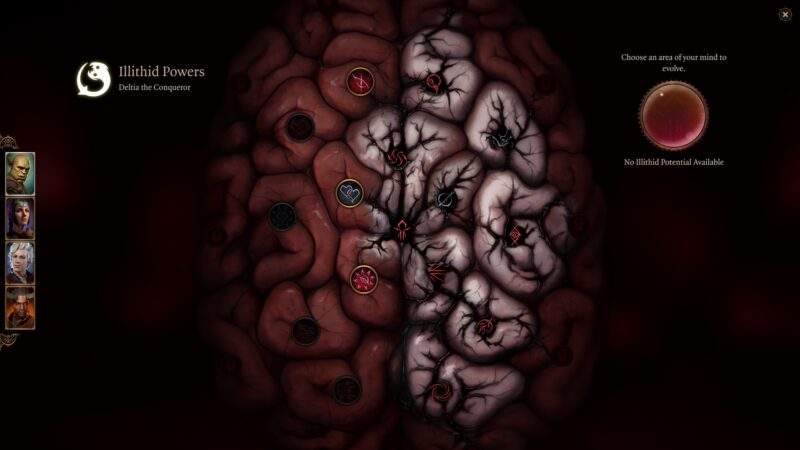
Illithid Powers are unlocked later in the game when you learn more about the Mind Flayers and tadpoles. You can gain jars of Mind Flayer Parasite Specimens, and consume them to gain one point. This is essentially another skill tree advancement with some very strong powers. If you decide to advance this skill line, these are the choices we suggest.
Here are the best Illithid Powers for the Best Baldur’s Gate 3 Druid Circle of the Moon Build:
| Illithid Powers | Description |
|---|---|
| Luck of the Far Realms | When you make a successful Attack Roll against a foe, you can change that hit into a Critical Hit. |
| Cull of the Weak | When you bring a creature down to fewer hit points than your number of evolved Illithid powers, it dies and all nearby creatures take 1-4 Psychic damage. |
| Psionic Backlash | When an enemy within 9m casts a spell, you can use your reaction to inflict ld4 Psychic damage to the caster per the spell’s level. |
| Blackhole | Area-based suck-in that slows targets. |
| Repulsor | Massive area knockback that can hit friendlies. |
| Charm | This is the priority power you want to obtain because you can force enemies to attack something else. |
Druid Level Progression
| Level | Class | Selection |
|---|---|---|
| 1 | Druid | Shillelagh, Thorn Whip, Healing Word, Ice Knife, Thunderwave, and Cure Wounds |
| 2 | Druid | Subclass: Circle of the Moon |
| 3 | Druid | Flaming Sphere |
| 4 | Druid | Feat: Ability Improvement Wisdom, Guidance, Heat Metal |
| 5 | Druid | Call of Lightning, Sleet Storm |
| 6 | Druid | Owlbear, Gust of Wind |
| 7 | Druid | Ice Storm, Conjure Woodland Beings |
| 8 | Druid | Feat: War Caster, Confusion |
| 9 | Druid | Conjure Elemental, Mass Cure Wounds |
| 10 | Druid | Poison Spray, Insect Plague, Improved Wild Strike |
| 11 | Druid | Heroes’ Feast, Heal |
| 12 | Druid | Feat: Ability Improvement Wisdom, Stoneskin |
You’ll get more powerful spells, cantrips, and Wild Shape forms as you progress and gain new levels. Here are the best spells listed to choose for each Druid Circle of the Moon level in BG3.
Level 1
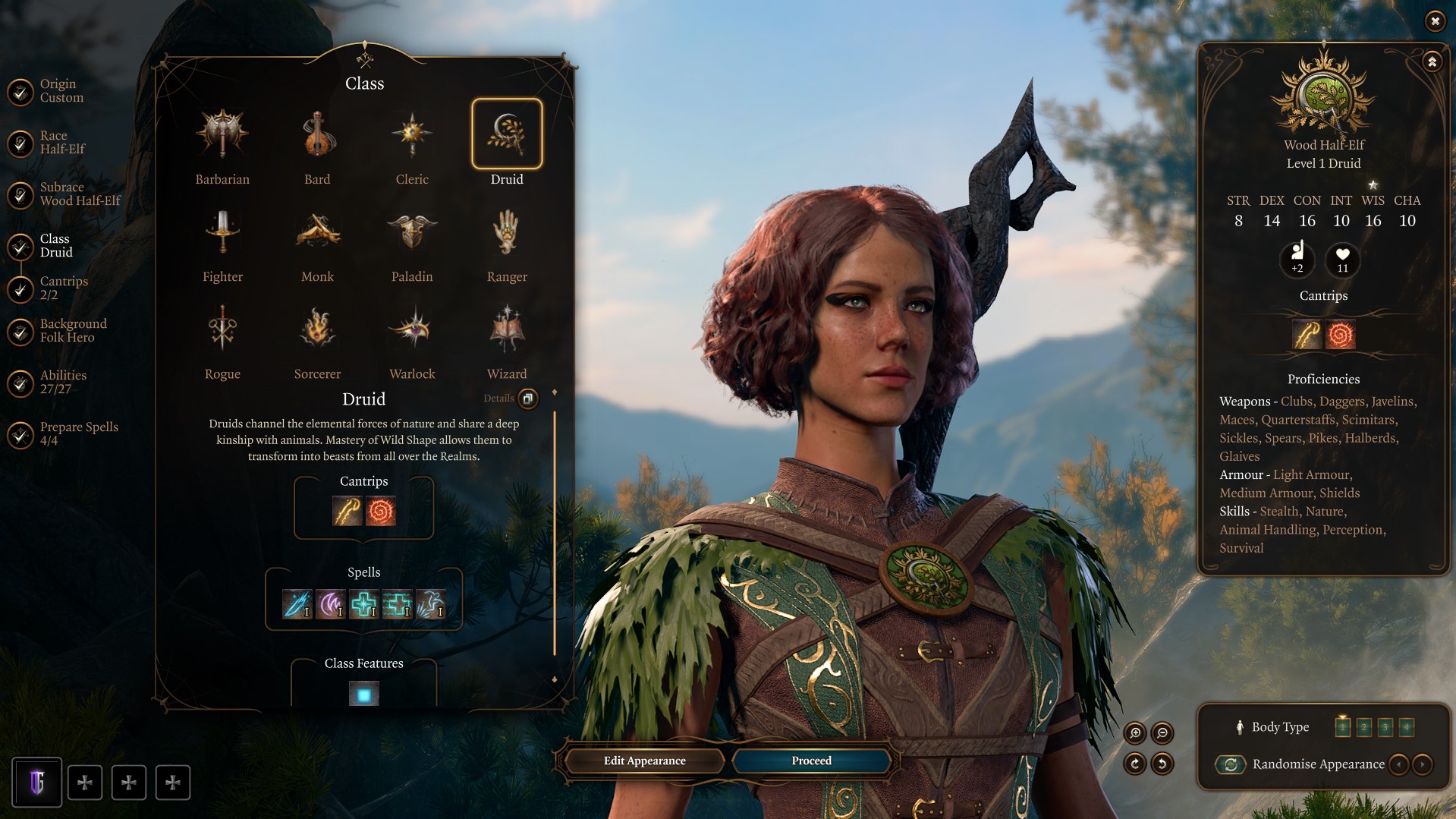
Druid at level 1, you should follow our character creation steps. Select the correct background, race, skills, and ability score focusing on Wisdom and Constitution. You pick a subclass at level 2, so expect a slow start in terms of performance. At level one, you will select the ideal Cantrips and Spells. You can select two cantrips and four spells. Here are two cantrip suggestions:
- Shillelagh Cantrip: Imbue your staff or club with nature’s power. It becomes magical, deals 1d8+2 Bludgeoning damage, and uses your Spellcasting Ability for Attack Rolls. This is great because it uses a bonus action, not an action, and does not require concentration.
- Thorn Whip: Strike at a creature with a thorny, vine-like whip and pull it 3m closer to you. This acts as a way to control targets, mainly casters or someone you need to pull closer. Swap to Guidance if you do not have a Cleric or another spellcaster with this Cantrip. It’ll make speech checks much easier.
Druid Spell Selections
For Druid spells at this level, we consider this a Wild Shape dominant build, and here are suggested spells:
- Thunderwave: Release a wave of thunderous force that pushes away all creatures and objects (2d8 Thunder). This spell acts as a knockback and should be offensive to get instant kill-off ledges.
- Cure Wounds: Touch a creature to heal it. Costs an action and needs to be in the melee range to heal, but you can pair them together with Healing Word.
- Healing Word: 18m range heal 1d4. This spell is great because it requires a bonus action rather than an action and a level 1 spell slot.
- Ice Knife: Throw a shard of ice that deals 1∼10 Piercing damage. It explodes and deals 2∼12 Cold damage to anyone nearby. This is a great range damage dealing spell at the start of the game that can cause the prone status effect.
- Enhanced Leap: Triple a creature’s jumping distance. Rarely used, but can be helpful outside of combat to reach hidden areas.
Level One Prepared Spells: Healing Word, Ice Knife, Thunderwave, and Cure Wounds.
Gameplay: you won’t be able to Wild Shape just yet so rely on your spells and cantrips for damage at this level. The main damage skill is Ice Knife and Shillelagh cantrip. Thankfully you won’t be at this level long, and then you can Wild Shape using spells in conjunction with animal abilities.
Druid Gameplay & Priorities
During the early phase of BG3, your Druid will want to equip anything at the start of the game. Transition to medium armour and quarterstaff with a shield at level 2 after selecting your subclass. It’s not until later in Act 3 you find and equip powerful Light Armour sets. Until then, keep your AC high outside of Wild Shape form.
Your overall priority with this build is the following:
- Complete Prologue
- Recruit Companions
- Reached Hollowed City/Druid Grove
- Sell, Stock up, complete quest
- Unlock Withers, respec companions if needed
- Progress to level 5
- Reach Underdark and Grymforged
Following these steps ensures a strong foundation for her especially if you plan on playing solo or on Honour Mode difficulty.
Level 2
At level two, you will want to pick the Circle of the Moon subclass. This subclass gives you two important perks to help with Wild Shape:
- Combat Wild Shape: use a bonus action to assume the form of a beast. You may transform twice per short rest.
- Lunar Mend: Expend spell slots to regain hit points while wild-shaped. You regain 1d8 hit points per level of the spell slot.
Level two will also unlock another level 1 spell slot.
- Entangle: Vines sprout from the ground, slowing creatures within and possibly Entangling them. This acts as a concentration-based single-target crowd control ability.
Wild Shape Gameplay
You want to use the Wild Shape forms for various combat situations. At this level, the Wolf is your damage dealer, the Spider is great for snares and immobilization and the Badger is great for utility and damage because it has 3 attacks. If you “die” or reach 0 HP in Wild Shape form, you will revert back to your physical form. So, you can use this as an extra health bar if you are in trouble.
The downside to going into Wild Shape is losing access to all your spells. You will have the animal’s abilities, spells, and access to self-heal. This is why the build is more of a damage dealer than support. So be wary, if you want to off-heal teammates, you can exit the Wild Shape form and do it manually.
Gameplay: On your first turn try to open up with a damage spell using your action first. Typically this Ice Knife or Thunderwave if enemies surround you. Then use your Bonus Action to transform into a Wild Shape. Typically the Badger at this level. Now go offensive and use the Badger skills. Burrow is a great crowd-control effect if your team needs control. Also, consider going out of Wild Shape manually when you need to cast another ability. This method of casting, and transforming will be the gameplay loop from this point forward.
Druid Level Two Prepared Spells: Healing Word, Entangle, Thunderwave, Cure Wounds, and Ice Knife.
Level 3
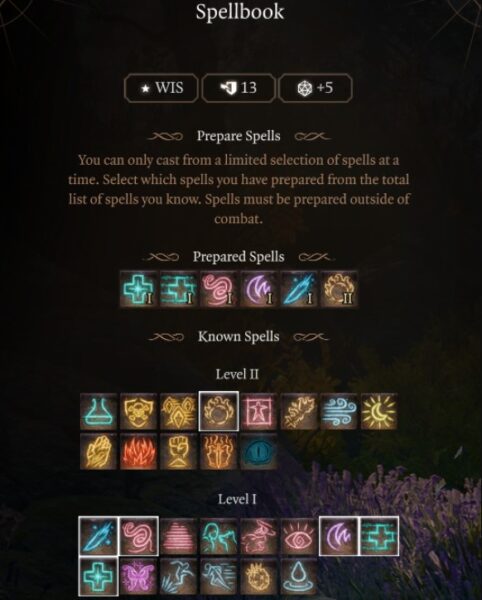
The Druid at level three unlocks the ability to cast level 2 spells along with more slots for level 1. Our suggestion is pick up Flaming Sphere.
Here are our two favorite new spells :
- Flaming Sphere: Summon a flaming sphere that damages nearby enemies and objects. The sphere sheds bright light in a 6m radius, and dim light for an additional 6m.
- While this doesn’t look impressive, it’s a god-tier skill. The sphere can be summoned at range, has a lot of health, and often soaks up all the damage for your party. It requires concentration so you’ll want to avoid using another concentration spell. Cast it ahead when you expect big damage coming from multiple sources. You can also cast Flaming Sphere with your action, then use a bonus action to Wild Shape. This will not drop concentration and is very helpful at this level.
Gameplay at this level is somewhat similar to before. Cast Flame Sphere, get into your preferred Wild Shape, and do damage!
Level 3 Prepared Spells: Healing Word, Entangle, Thunderwave, Cure Wounds, Ice Knief, Flaming Sphere.
Level 4
At level four you can choose between a feat (feature) or an increased ability score, specifically Wisdom. Increase Wisdom by two to reach 18 as the feats for Druids aren’t that impressive. You will get another Cantrip and another level 2 spell slot.
Cantrip
- Guidance: Bestow guidance upon an ally. They gain a +1d4 bonus to Ability Checks. This is a great spell to use during dialogue and helps support conversation dice rolls.
Spell
- Heat Metal: the TLDR on this is a skill, if someone is wearing a metal weapon or armor, they can drop their armor and take damage. This requires concentration and has an 18m range. It’s essentially a must-have skill against hard-hitting Fighters and Barbarians and completely shuts them down and does damage.
Deep Rothe Shape: this will be unlocked at this level. This form is amazing for crowd control. Being able to charge ahead and knock a group of enemies in prone is awesome for the group. Use this form when you need mobility, melee damage and stuns.
Gameplay at this level gives you some flexibility in your opening spell. Typically its Flame Sphere unless you need to drop an enemies weapon with Heat Metal. Wild Shape into Deep Rothe gore is your skill for damage, while Charge is your crowd control skill.
Level 4 Prepared Spells: Healing Word, Entangle, Thunderwave, Cure Wounds, Heat Metal, Flaming Sphere, Ice Knief.
Level 5
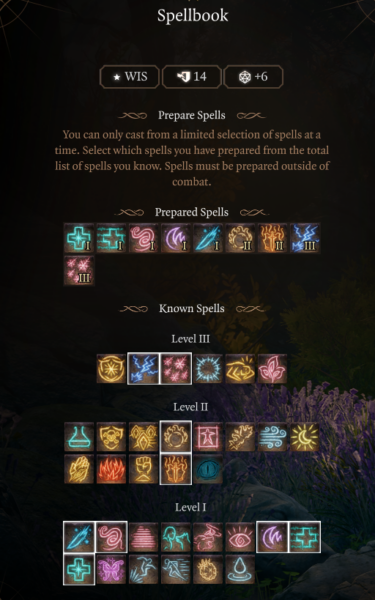
At level five, you get access to two level 3 spells which are very powerful. What you select will depend on your group composition. Meaning, if you have a Wizard in the group focused on heavy area damage, you may want to make a different selection. Typically, the level 3 spells have a huge jump in power and can really damage massive groups at once so that will be our focus. Additionally, you unlock Wild Strike while in Wild Shape form.
Spells
- Call of Lightning: Call down lightning to hit all targets within range. Each turn can call down lightning again without expending a spell slot. The strength of this spell is the massive damage and that you can apply the spell with an action. This gives the Druid a huge range area damage nuke that can be used in conjunction with other range spells.
- Sleet Storm: Call forth a storm of sleet that douses fires, creates an ice surface, and disrupts the concentration of spellcasters. This spell allows you to create an elemental damage spell in a massive 9m area. It also disrupts casters and is a ranged spell. Cast this at a choke point with heavy melee aggressors with ice and watch them fall prone. Or shut down the range caster and protect your group.
Wild Strike Explained
Wild Strike: make an additional attack after making an unarmed strike while in Wild Shape. This is essentially like an extra attack for Rangers, Fighters, Barbarians, etc.
Gameplay at this level expects a big jump in damage with spells, both of which are area-based. Also, your Wild Shape damage will be much higher allowing you to attack twice. Ideally, you want to use your big area-based damage or Flame Sphere first, then Wild Shape and prepare for melee battle on turn two.
Level 5 Prepared Spells: Healing Wound, Entangle, Thunderwave, Cure Wounds, Ice Knief, Heat Metal, Flaming Sphere, Call of Lighting, and Sleet Storm.
Level 6
At level 6 you get one additional spell and two new forms. The spell choice is up to you, Ice Knife defaults back in this position and its a solid choice for range damage when we have limited level 3-4 spell slots.
- Wild Shape: Panther: consider this the damage dealer of the two new entries. It has a unique attack Juglar strike, which deals extra damage to prone enemies. This is easy to proc with ice spells or other crowd control. The combo you can use to take advantage of is having someone shoot an Ice Arrow at range with a high probability of being prone. Then on your turn, you can pounce doing much more damage.
- Wild Shape: Owlbear: consider this form great area damage and crowd control CC. This form also has a ton of damage and should be used when you need to rush into a large group of enemies and stun them to relieve pressure from your group.
Spell
- Gust of Wind: Summon a strong wind that clears all sounds and pushes creatures back 5m, forcing them Off Balance. This can be helpful as a strong area knockback similar to and a bit better than Thunderwave.
At this level, you have more options in Wild Shape and Spells. Combine area damage spells with whatever needs you have for Wild Shape like single target damage or area. I typically used the Owlbear because the Enrage Action area skill can frighten enemies in a radius. This shape also has a ton of health as well.
Ending Act 1 with Circle of the Moon Druid
At about this level, you should be close to transitioning out of Act 1. Make sure to visit merchants and stock up on camp and alchemy supplies. Furthermore, look over the best Act 1 items. There are also permanent bonuses you can acquire in Act 1. Lastly, Grymforge has powerful armor and weapons (Adamantine) that can aid you well into Act 3. Consider taking the time to collect the crafting items before transitioning to Act 2, where you won’t be able to return (Moonrise Tower).
Level 6 Prepared Spells: Healing Wound, Entangle, Thunderwave, Cure Wounds, Ice Knief, Heat Metal, Flaming Sphere, Call of Lighting, Sleet Storm, Gust of Wind.
Level 7
At level 7, you get access to level 4 spells. You can select more than one if you wish and we suggest taking two:
- Ice Storm: deals 2d8 bludgeoning damage and +4d6 cold damage in a massive 6m radius.
- Conjure Woodland Beings: summons a fey creature friendly.
Ice Storm acts as another massive area of damage, that can trigger status effects. Conjure Woodland is useful because it doesn’t require concentration. In essence, you could use both Flame Sphere and Conjure Woodland for two companions aiding you. The Woodland creatures also have a lot of spells and skills useful for damage and crowd control. They can fulfill that role, while you Wild Shape into a damaged form.
At this level, drop Gust of Wind pick up both level four spells, and use one during combat. The picture prepared spells is slightly off, don’t take Flame Blade, instead use Ice Knife. On tough fights, I use my spell slot for Conjure Woodland Being rather than Ice Storm.
Level 7 Prepared Spells: Healing Wound, Entangle, Thunderwave, Cure Wounds, Ice Knief, Heat Metal, Flaming Sphere, Call of Lighting, Sleet Storm, Ice Storm, Conjure Woodland Being.
Level 8
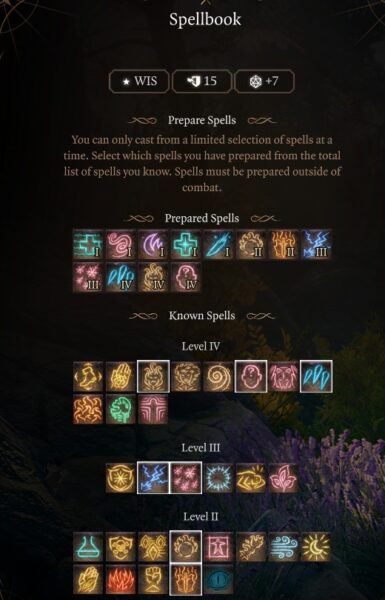
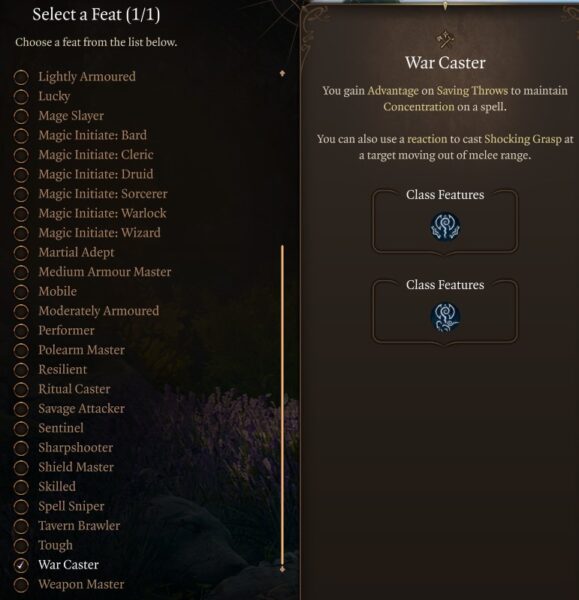
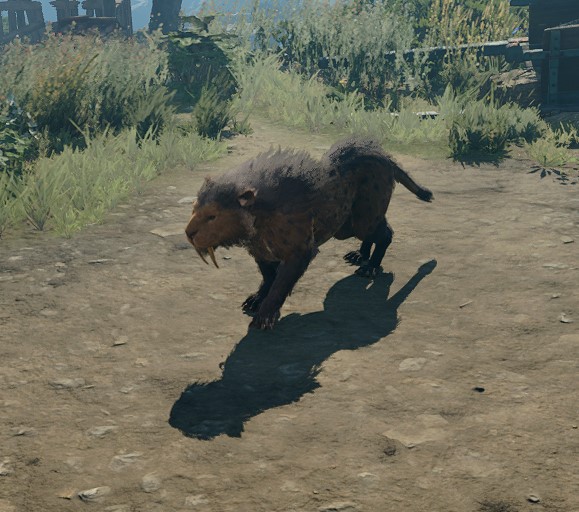
Level 8 you get another Wild Shape, an additional spell slot, and a feat. We suggest taking the War Caster feat, Confusion Spell, and explaining the Saber Tooth Tiger Wild Shape form.
- War Caster: You gain Advantage on Saving Throws to maintain Concentration on a spell. You can also use a reaction to cast Shocking Grasp at a target moving out of melee range. War Caster helps dramatically maintain concentration which is almost always active for our build. We will use the level 12 feat to push our Wisdom to 20, but after testing this was more helpful at level 8.
- Confusion: Befuddle a group of creatures, causing them to attack at random, wander around aimlessly, and occasionally skip turns in the stupor. Usage: a massive crowd control skill and one of the best because it can make enemies attack each other and has a massive area.
- Wild Shape: Sabre-Toothed Tiger: this is just a better version of the Panther with similar damage and skills (jugular). To make the most out of the damage, you want to attack Prone (knocked down) targets. You can proc this effect with cold damage and even cast your cold spells prior to transforming. Companions and allies can proc this as well, and focus on those targets for extra damage.
Level 8 Prepared Spells: Healing Wound, Entangle, Thunderwave, Cure Wounds, Ice Knief, Heat Metal, Flaming Sphere, Call of Lighting, Sleet Storm, Ice Storm, Conjure Woodland Being, Confusion.
Level 9
At level 9 the Druid gains access to level 5 spells. We want to drop Conjure Woodland Being and pick up Conjure Elemental and Mass Cure Wounds.
- Conjure Elemental: Bend the barrier between the Planes until they disgorge an elemental ally to follow and fight for you. This will summon one of possibly four different Elemental creatures to fight for you. I prefer the Earth Elemental because it can stun opponents. Whatever you summon, will follow you around and fight for you and not require concentration. The amount of damage and pressure these things can handle is staggering and I highly recommend using it. You can pre-cast this before combat after a long rest and keep the elemental the entire time even when you Wild Shape.
- Mass Cure Wounds: Up to 6 creatures regain 3d8+Spell Ability modifier. This spell acts as a massive group heal rather than a single target. You can select up to 6 allies making it great when your entire team needs a big heal. The radius is generous and the healing is good. You can combine this with bonus action Healing Word and double the heal potential within one turn.
Level 9 Prepared Spells: Healing Wound, Entangle, Thunderwave, Cure Wounds, Ice Knief, Heat Metal, Flaming Sphere, Call of Lighting, Sleet Storm, Ice Storm, Confusion, Mass Cure Wounds, Conjure Elemental.
Level 10
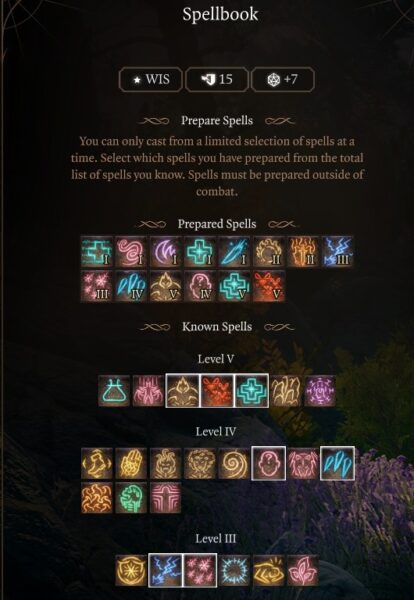
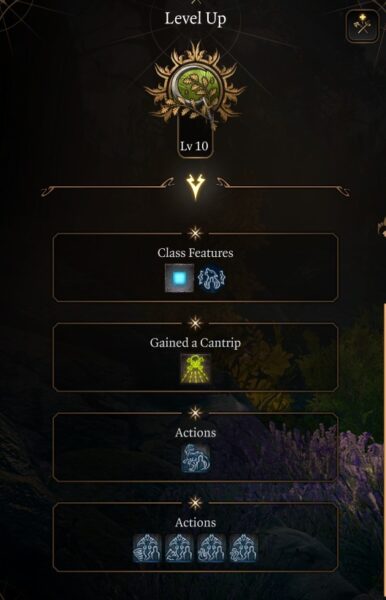
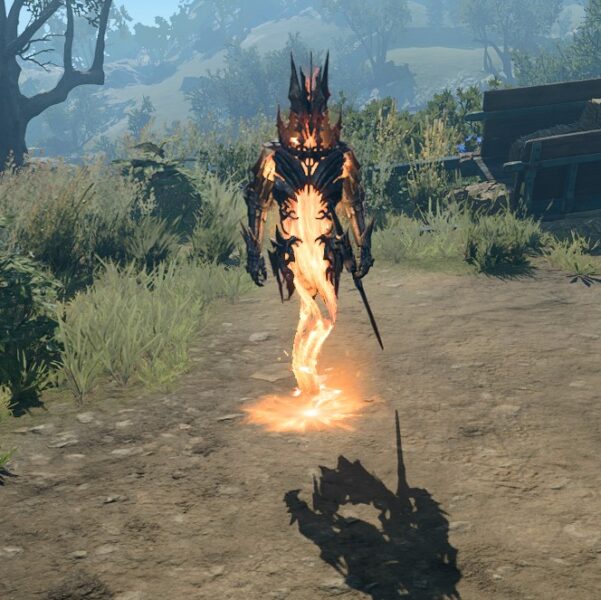
Level 10 the Druid unlocks multiple Wild Shape Forms, a Cantrip, new Wild Shapes, and a new spell.
- Poison Spray Cantrip: Project a puff of noxious gas dealing 1-12 Poison damage in a 3m radius. Simple Poison cantrip we are most likely not going to use at this level.
- Insect Plague: Locusts attack everyone within range, make the area Difficult Terrain, and impose Disadvantage on Perception Checks.
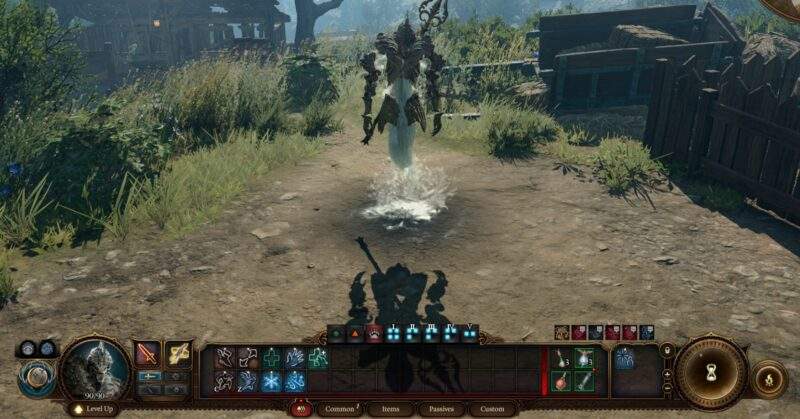
- Improved Wild Strike: You can make 2 additional attacks after making an unarmed strike while in Wild Shape. This mimics the Extra Attack Fighters and other melee classes get, giving you two more attacks.
Wild Shape Dilophosaurus: Take the shape of a dilophosaurus whose Corrosive Spit can dissolve a target’s Armour Class. This is a decent Wild Shape form, but we get better ones with the Moon subclass so I usually don’t use this.
Wild Shape Myrmidon (subclass feature: with the Circle of the Moon subclass) we can summon one of four different Myrmidon creatures; Air, Earth, Fire and Water. Each comes with their three skills or spells. The Water Mymidon is my favorite because it has ice damage and a healing spell. This means you can stay in Wild Shape form doing damage while off-healing which the other Wild Shapes cannot do. These Myrmidon also cost two Wild Shape charges, not one but they are considerably more powerful.
At level 10 you can now cast Insect Plague and then Wild Shape into an Water Myrmidon. Don’t forget to maintain your summon during combat and it doesn’t require concentration giving you a massive advantage.
Level 10 Prepared Spells: Healing Wound, Entangle, Thunderwave, Cure Wounds, Ice Knief, Heat Metal, Flaming Sphere, Call of Lighting, Sleet Storm, Ice Storm, Confusion, Mass Cure Wounds, Conjure Elemental, Insect Plague.
Level 11
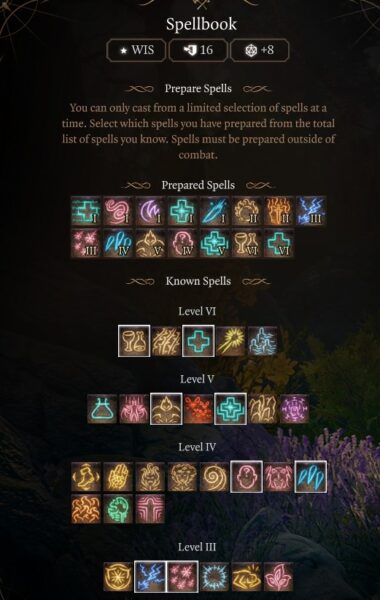
At level 11 the Druid unlikes the final tier of spells, level 6 spell slots. We are going to drop Insect Plague and pick up both Heroes’ Feast and Heal.
- Heroes’ Feast: Produce a feast for 12 guests that cure diseases, immunizes to poison, and increases hp by 2d10 for 24 hours. Utility skill for help with status effects and increase health pool. The strength of this skill is it last until long rest, and you can cast your Conjure Elemental immediately following a long rest and it not fall off.
- Heal: heal for 70 damage and heal a target’s wounds and remove Blindness and any diseases. Simply put the best single target heal in the game. You only get one spell slot of level 6, so you will need to choose a burst heal or buff with Heroes’ Feast, but this will give you some flexibility.
Level 11 Prepared Spells: Healing Wound, Entangle, Thunderwave, Cure Wounds, Ice Knief, Heat Metal, Flaming Sphere, Call of Lighting, Sleet Storm, Ice Storm, Confusion, Mass Cure Wounds, Conjure Elemental, Heroes’ Feast, Heal
Level 12
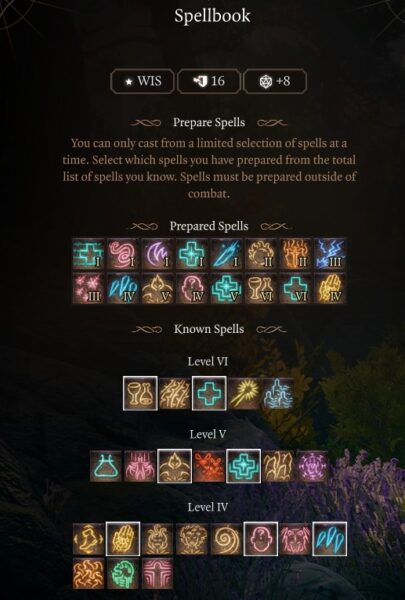
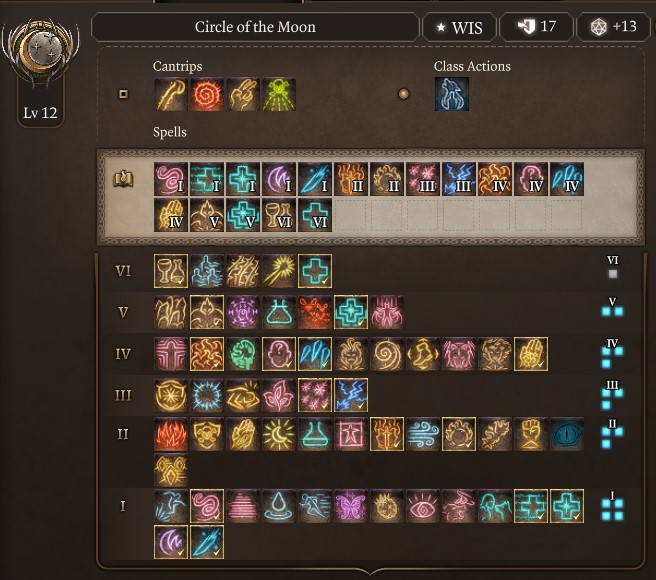
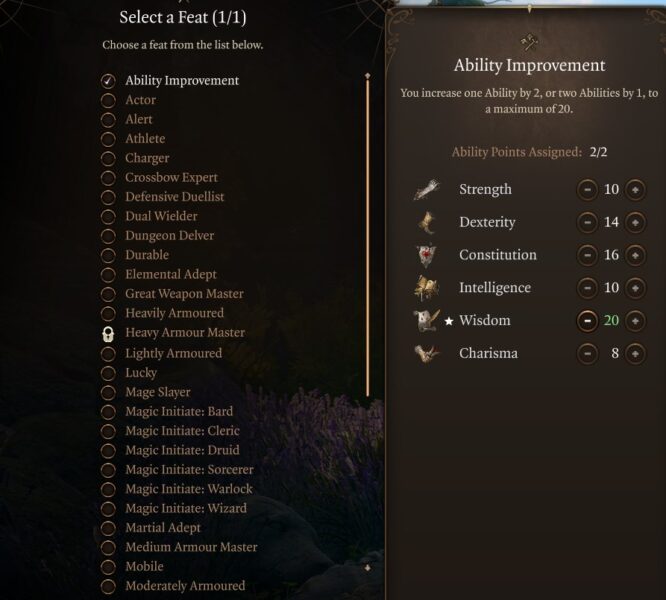
Congratulations on reaching the max level as a Druid in Baldur’s Gate 3. At level 12, you will gain access to another spell slot. I suggest taking an earlier game spell Stoneskin. We will use our level 6 spell slot for a burst heal and Heroes’ Feast after long rest, so the skill is a flexible choice.
- Feat: Take Ability Improvement for +2 to Wisdom increasing it to 20. This will give you great damage when casting spells before you Wild Shape or when you come out.
- Stoneskin: Turn a creature’s flesh hard as stone. It gains Resistance (half the damage) of all non-magical Bludgeoning, Piercing, and Slashing damage last until long rest and requires concentration. The benefit of this spell is it last until long rest. Meaning, as soon as you finish a long rest, you can cast this similar to other spellcasters using Mage Armour. The more spells and buffs you have that last until long rest, the more you can pre-cast and not use actions in combat. This makes a great durability skill to cast on yourself or a friend prior to jumping into combat.
Level 12 Prepared Spells: Healing Wound, Entangle, Thunderwave, Cure Wounds, Ice Knief, Heat Metal, Flaming Sphere, Call of Lighting, Sleet Storm, Ice Storm, Confusion, Mass Cure Wounds, Conjure Elemental, Heroes’ Feast, Heal, Stoneskin
Best Gear for Baldur’s Gate 3 Druid Circle of the Moon Build
In Games like Baldur’s Gate 3, you’ll explore the world, loot chests and your enemies’ dead bodies, and complete quests and all those activities can reward you with useful items, potions, armor, weapons, scrolls, and much more. Progression and finding new gear are part of the game, and you will organically get more powerful weapons during your journeys.
Beginner: Act 1
Below is the best beginner gear for the Best Baldur’s Gate 3 Druid Circle of the Moon Build:
| Gear Slot | Best Gear Item | Effect |
|---|---|---|
| Head | Wapira’s Crown | Additional Healing |
| Cape | – | |
| Chest | Adamantine Scale Mail | 16 AC Medium |
| Gloves | Hellrider’s Pride | Heals give resistance |
| Boots | Boots of Aid and Comfort | Additional Temporary HP |
| Necklace | Amulet of Misty Step | Misty Step Spell |
| Ring | Ring of Absolute Force | Thunderwave Spell |
| Ring | The Whispering Promise | Healing gives Blessed |
| Weapon 1 Main Hand | Staff of Arcane Blessing | Free Blessed Spell |
| Weapon 1 Off-Hand | Glowing Shield | HP When Low |
| Weapon 2 Ranged | Hunting Shortbow | Hunter’s Mark Spell |
Below is a list of the best Act 1 items for the Circle of the Moon Druid:
- Wapira’s Crown: Reward from Zelvor for killing 3 Goblin leaders (Alternative Haste Helm).
- Adamantine Scale Mail: Complete Adamantine Forge Quest (Alternative Hedge Wanderer Armour or Githyanki Half Plate)
- Hellrider’s Pride: Can be bought, stolen, or earned from Zevolr (Alternative Gloves of Missile Snaring).
- Boots of Aid and Comfort: Sold by Grat The Trader at the Goblin Camp (Alternative Disintegrating Night Walkers).
- Amulet of Misty Step: Found in a Gilded Chest in Defiled Temple (Alternative Amulet of Silvanus, or Absolute’s Talisman).
- Ring of Absolute Force: Dropped by Sergeant Thrinn in Grymforge (Alternative Crusher Ring).
- The Whispering Promise: From traders Zhentarim Hideout, Goblin Camp, Druid Grove, or Shattered Sanctum (Alternative Ring of Colour Spray).
- Staff of Arcane Blessing: Obtained in Arcane Tower (Alternative The Watcher’s Guide).
- Glowing Shield: Found in a chest on a slope behind the goblin camp. (X: -54, Y: 462) (Alternative Adamantine Shield, or Wood Woad Shield).
- Hunting Shortbow: Sold by Dammon in the Druid Grove.
Read More – Baldur’s Gate 3 Shadow Magic Sorcerer Build
Advanced: Act 3 End Game
| Gear Slot | Best Gear Item | Effect |
|---|---|---|
| Head | Shapeshifter Hat | +1 Wild Shape |
| Cape | Mantle of the Holy Warrior | Free Crusader’s Mantle Spell |
| Chest | Armour of Moonbasking | HP On Wild Shape |
| Gloves | The Reviving Hands | Healed Gain Blade Ward |
| Boots | Helldusk Boots | Cannot be Moved |
| Necklace | Amulet of Greater Health | 23 Constitution |
| Ring | Crypt Lord Ring | Free Create Undead |
| Ring | Ring of Regeneration | Automatic Healing |
| Weapon 1 Main Hand | The Blood of Lathander | Sunbeam and Healing |
| Weapon 1 Off-Hand | Viconia’s Walking Fortress | 3 AC, Reflect Spell |
| Weapon 2 Ranged | Darkfire Shortbow | Free Haste Spell |
Below is a list of the best Circle of the Moon Druid Gear in Baldur’s Gate 3:
- Shapeshifter Hat: Sold by Helsik at the Devil’s Fee (Alternative Helm of Balduran, Helldusk Helmet).
- Mantle of the Holy Warrior: Sold by Vicar Humbletoes in Stormshore Tabernacle (Alternative Cloak of the Weave, or Cloak of Protection).
- Armour of Moonbasking: Sold by Voiceless Penitent Bareki in Act 3 (Alternative Helldusk Armour, Adamantine Scale Mail, Flame Enamelled Armour).
- The Reviving Hands: Sold by Vicar Humbletoes (Alternative Jhannyl’s Gloves)
- Helldusk Boots: Chest on the top floor of Wyrm’s Rock Fortress (Alternative Disintegrating Night Walkers).
- Amulet of Greater Health: Archive in the House of Hope (Alternative Amulet of the Devout, or Spellcrux Amulet).
- Crypt Lord Ring: The Mystic Carrion’s Servant quest (Alternative Shifting Corpus Ring).
- Ring of Regeneration: Sold by Rolan at Sorcerous Sundries(Alternative Ring of Free Action).
- The Blood of Lathander: The Blood of Lathander quest in Act 2 (Alternative Selûne’s Spear of Night, or Markoheshkir).
- Viconia’s Walking Fortress: Looted from Viconia DeVir in Act 3 (Alternative Shield of Devotion)
- Darkfire Shortbow: Sold by Dammon Last Light Inn Act 2.
Consumables for Circle of the Moon Druid BG3
The following list represents the best individual use consumable items that will aid in the Best Baldur’s Gate 3 Druid Circle of the Moon Build:
- Potion of Greater Healing: 8d4 + 8 healing and removes burning.
- Elixir of Bloodlust: Once per turn when you kill a foe, you gain HP 5 temporary hit points and an additional action.
- Potion of Invisibility: Become invisible for 1 minute. Attacking or casting spells ends the status.
- Potion of Flying: 10 turns of flying.
- Potion of Speed: 3 turns of an increased action via the Haste condition.
- Potion of Angelic Slumber: fall asleep for two turns, then restore all spell slots, hit points, and abilities.
- Elixir of Peerless Focus: gain advantage on concentration saves (ingredients Sublimate of Belladona, and any ashes).
- Elixir of Vigilance: gain +5 bonus initiative and you cannot be surprised (ingredients sublimate of bloodstained hook, any ashes).
- Superior Elixir of Arcane Cultivation: gain a level 3 spell slot (ingredients Solution of Night Orchid, any Vitriol).
- Elixir of Viciousness: increase your critical hit chance (ingredients Vitriol of Shadowroot Sac, any Ashes).
- Elixir of Universal Resistance: gain resistance to all damage (ingredients Vitriol of Divine Miasma, any Sublimate).
Druid Gameplay Tips and Tricks
Here are 10 gameplay, combat tips, and tricks for using the Best Baldur’s Gate 3 Druid Circle of the Moon Build:
- Use Bonus Actions: Use your bonus action to Wild Shape and heal yourself and don’t let it go to waste.
- Wild Shape: If a party member needs a heal, come out of the form and support them, then go back on the offensive.
- Pick Right Form: Use Wild Shape to select a creature with the desired effect like the Bear when you need a tank or Deep Rothé for cc.
- Rest: Make sure to use quick rest and long rest to replenish your spell slots before important fights.
- Flame Shape: Drop this ability in the fray and let it soak up all the damage for you party.
- Double Healing: Use spells like Goodberries and Healing Word to provide to heals in one turn.
- Use Consumables: In critical situations, you can use Potion of Speed or an ally shots a Fire Arrow to turn the tide of battle.
- Prone: Try to use ice spells to proc the prone status effect so late-game wild-shape forms can do better damage.
- Extra Attack: Make sure to attack twice in Wild Shape form after level 5 to get the most damage out of the build.
- Opening Turn: Use your hard-hitting damage spells as an opener and use a bonus action to go into Wild Shape.
Remember, this build guide serves as a foundation, and you can always adapt it to suit your preferences and the needs of your campaign. Enjoy playing as the formidable Circle of the Moon Druid!
Circle of the Moon Druid Changes in Patch 7 for BG3
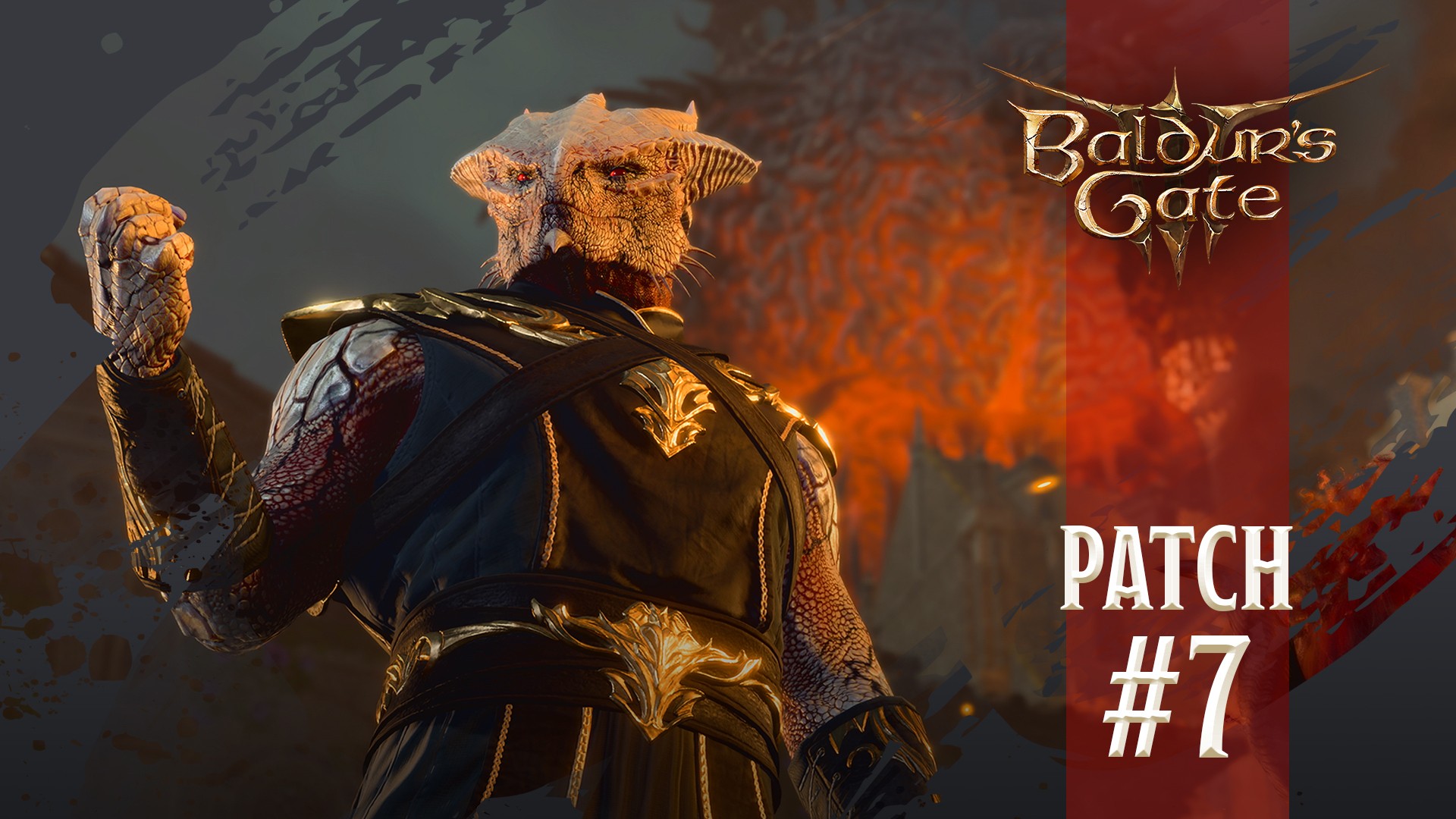
The release of Patch 7 for BG3 brought with it no significant combat, gameplay, or build-related change for the Circle of the Moon Druid. The main focus of this update was the final narrative additions, mostly centered around evil endings, along with official modding tools and adjustments to honor mode.
Furthermore, the game now features a modding toolkit and an in-game mod manager, allowing players to create and install mods directly within the game. Consequently, this update is intended to hand over creative control to the community. It enables players to produce unique content and continue the story in new ways.
Read More – Top 10 builds for Baldur’s Gate 3
Baldur’s Gate 3 Druid Build Summary Guide
Subclass Circle of the Moon
Armor: Light
Weapons: One-Handed & Shield
Background – Folk Hero
- Strength 8
- Dexterity 14
- Constitution 16
- Intelligence 10
- Wisdom 16
- Charisma 10
Level Progression
- Level 1 – Ice Knife Spell
- Level 2 – Wild Shapes Unlocked
- Level 3 – Flaming Sphere Spell
- Level 4 – Feat +2 Wisdom
- Level 5 – Call of Lightning Spell
- Level 6 – Gust of Wind Spell
- Level 7 – Conjure Woodland Beings Spell
- Level 8 – War Caster Feat
- Level 9 – Conjure Elemental Spell
- Level 10 – Insect Plague Spell
- Level 11 – Heroes’ Feast Spell
- Level 12 – Feat +2 Wisdom
Looking For More About Baldur’s Gate 3?
Thank you for reading Best Baldur’s Gate 3 Druid Circle of the Moon Build Guide. We provide the latest news and create guides for Baldur’s Gate 3. Also, watch me play games on Twitch or visit my YouTube channel!
 Reddit
Reddit
 Email
Email
